#but there is a general thread that people can publish all the studies they want. & it won’t stop ppl from ‘knowing’ ‘reality’ and…
Explore tagged Tumblr posts
Link
I first want people to note the date of the article and the original post: 2022. Hindsight tells me, studies can only do so much in the face of bigotry; there is a lot of on-the-ground and legal work that must be done (by us queer people, of course, as who else is up to the task).
Yahoo is a fairly mainstream news site. Most of the users and readers are going to be your average, run-of-the-mill person. It’s not mumsnet or any of those forums that disproportionately attract transphobes. However, this Yahoo comment section is overrun by bigots telling us exactly this: it doesn’t matter what a study says, I won’t change my mind.
The comments section is full of people who love Littman’s work; it is full of people who believe in ROGD. (And— of course— none of them stop to consider the misogyny at the foundation of ROGD: the idea that teen girls are very, if not uniquely, susceptible to hysteria.) “Young minds are susceptible to peer influence and internet trends.” They fully believe this study is junk science and that doctors and teachers are out here to “butcher” and “mutilate” and “brainwash” all our children. One user went as far as to compare pediatricians to the Nazi doctors of Auschwitz.
The comments section is split between them and people arguing that parents need to teach their kids “reality” because kids aren’t mature enough to understand themselves, and are easily manipulated (oft by the predatory LGBT adults, as no child would ever think about crushes or their place in this world without an outside influence “filling” their head with sex). They hold that the social pressure to be queer is what’s driving them to suicide and is what’s behind the rise in depression and anxiety among our youth.
The comments section shows a lot of what is wrong with our culture and society. In the commenter’s world, children are not entitled to bodily autonomy and they do not possess personhood or minds capable of reasoning, rationale, or of perceiving themselves. Children do not have rights (someone literally said this). And experts? They’re never to be trusted. They have devious agendas and secret plans to (destroy the Aryan race) queer your children and cripple their bodies. (Lots of ableism baked into these anti-trans arguments.)
There are a couple of comment-types I’d like to highlight for those who have yet to understand how important solidarity is for progress:
The first vein of commenters are those who believe that young girls thinking they’re a lesbian or bi— or that being LGB at all— is a social contagion. These commenters believe that it’s either “just a phase” or influence from adults, because heterosexuality is what’s “normal” (where homosexuality and “transgenderism” are defective, and unnatural).
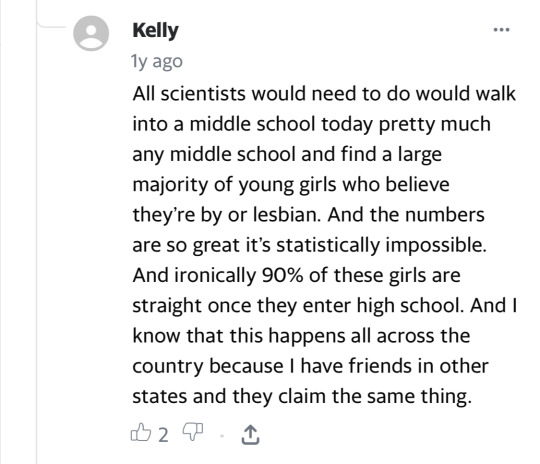
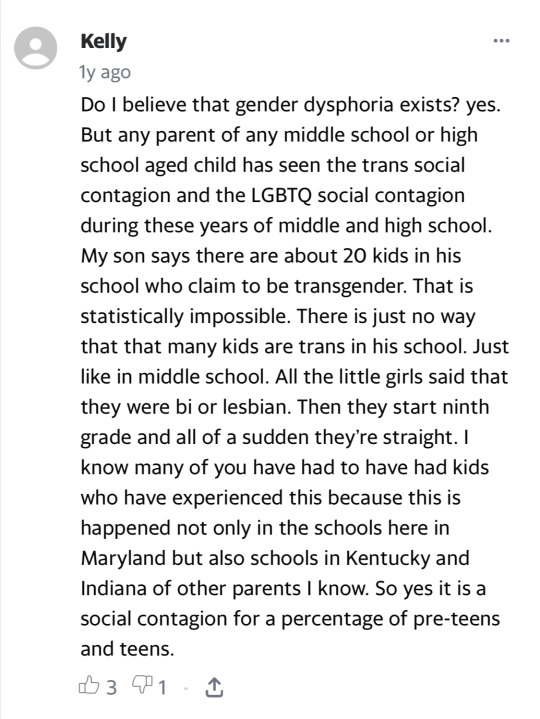
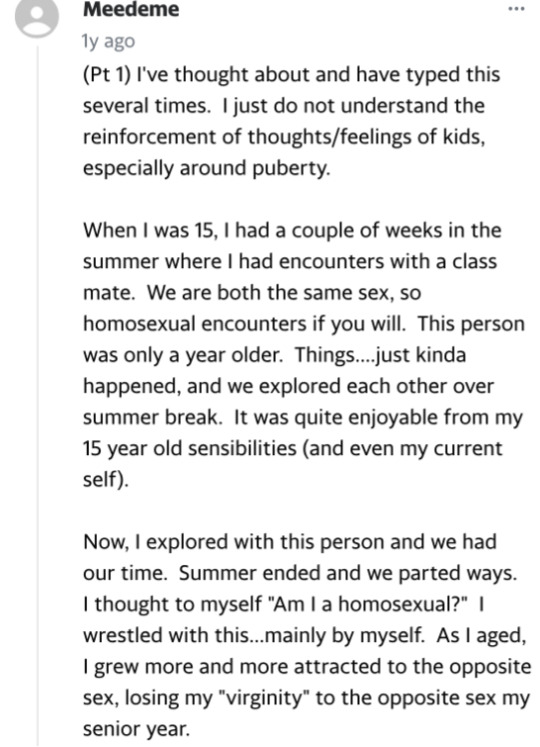
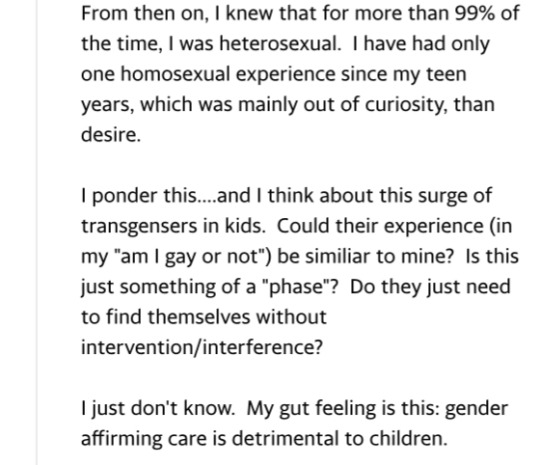
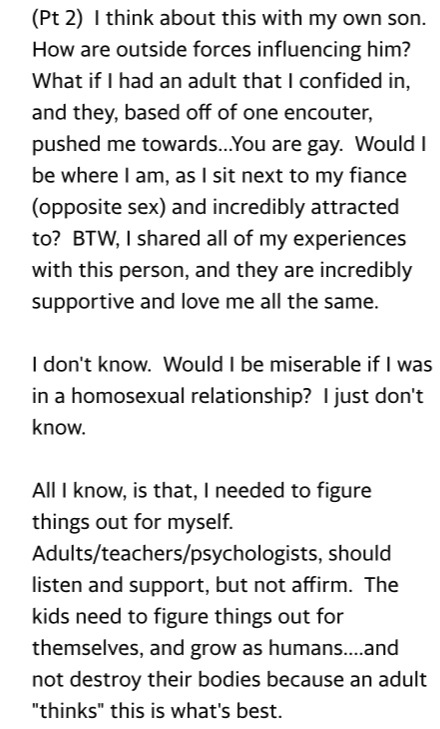
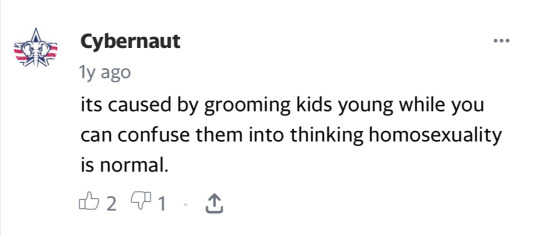
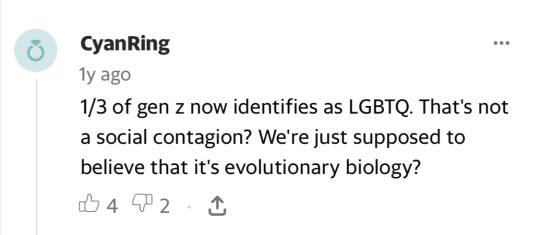
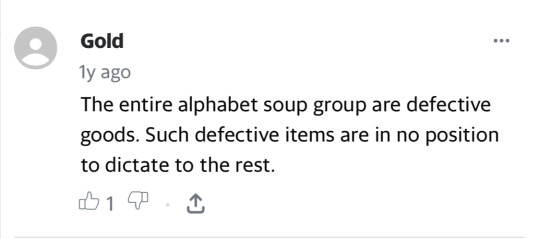
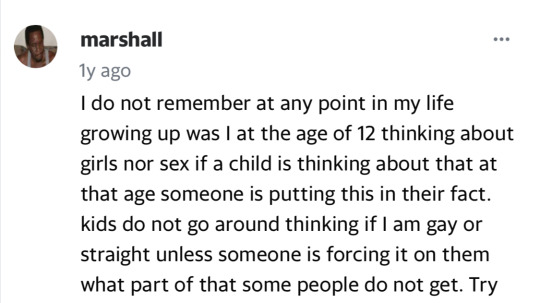
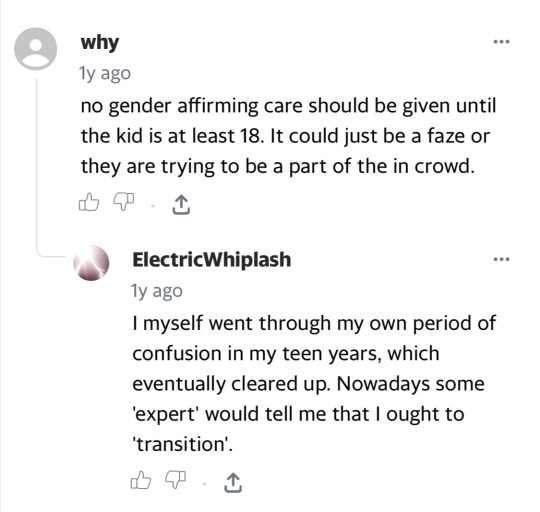
The second vein of commenters are those who believe this “issue” stems from a weakened patriarchy and a loss of traditional family & religious dynamics and values. Queerness is a result of children not having a firm patriarchal hand or “masculine force” in their life (lots of low T comments). Queerness is an affront to god and people’s usual way of life.
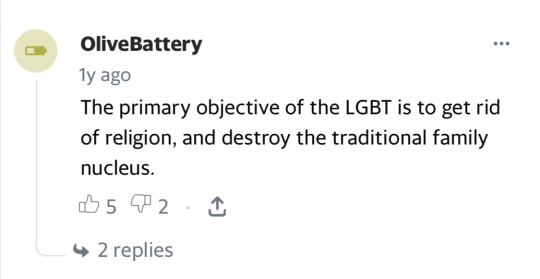
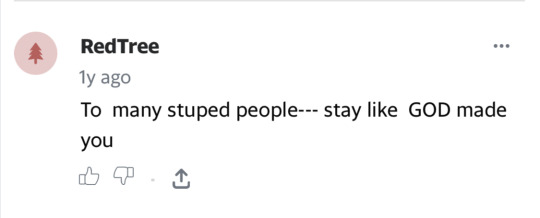
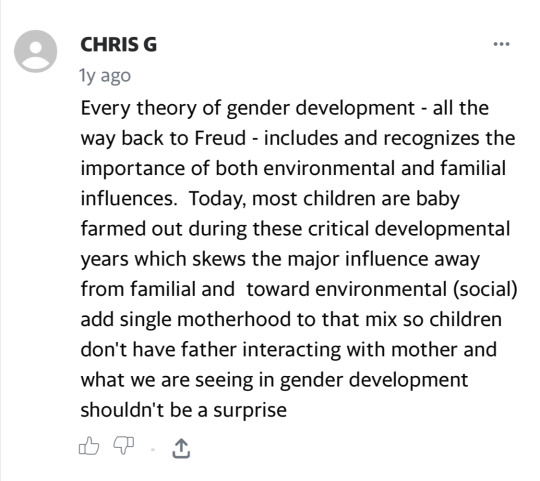
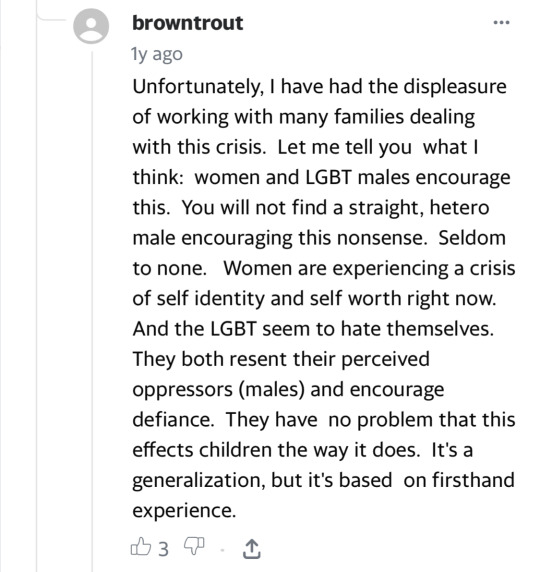

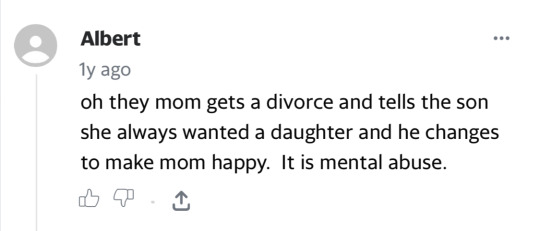
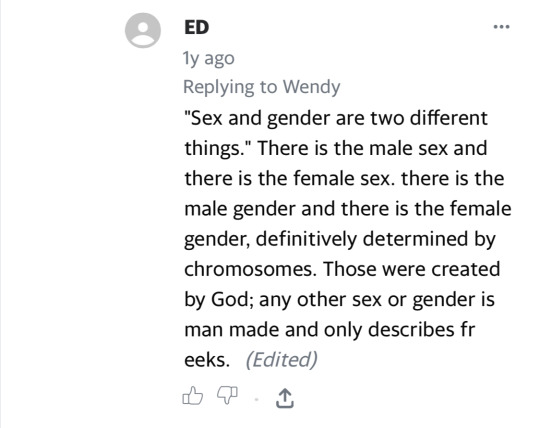
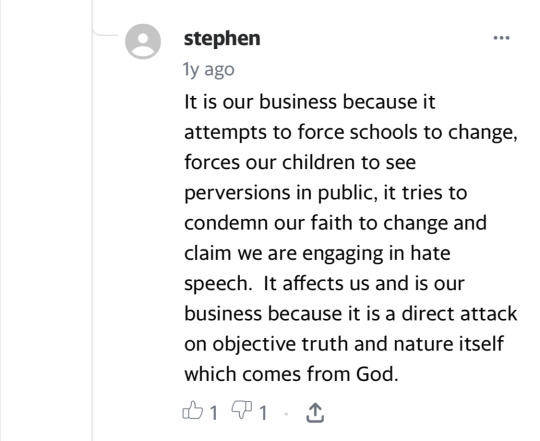
Bonus personal favorite to roll my eyes at:
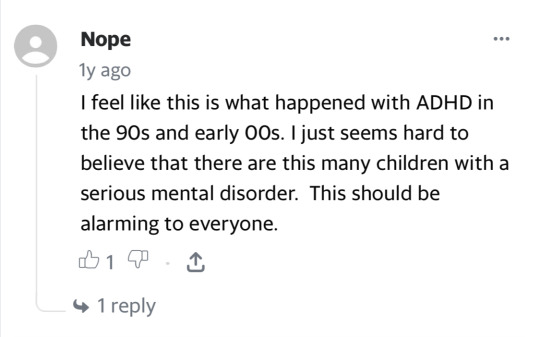
This is a reminder that these are the “leopards,” and that their political figures’ hack apart communities to weaken a community’s organizing power, often capitalizing on unlearned biases and existing schisms in a community to be successful.
It’s on us to unlearn and combat harmful ideas, from transphobia to lesbophobia to misogyny to white supremacy & racism (there was a fuck ton of racism in those comments, too) so this cannot work. So many of us have yet to fully understand what “community” really means, and it’s going to take a community to leave behind a better world for queer children.
#The commenters all knew their conclusions to be true because the researchers are not conservative…#and let’s say I uncritically accept that premise#why— do you suppose— would those people not universally and foundationaly opposed to human rights *not* be conservative?#Also add in several comments about how back in their day there were not LGBTs#and throw in some anecdotal stories about your cousin’s wife’s friend’s sister’s school and a random relative#that prove neither cause and effect nor widespread evidence of and data supporting their worldview#but there is a general thread that people can publish all the studies they want. & it won’t stop ppl from ‘knowing’ ‘reality’ and…#…from believing as they do.#B/c. as a hate movements. their ideology is not based in facts and data. but feelings like anger and fear of social & hierarchy change#so they reject science in the vain conclusion that they— and their ways— are more correct than any other way of living#one man was in there literally arguing against Evolution
35K notes
·
View notes
Text
The Age Old Debate: Fire Good, or Fire Bad?
This was originally going to be part of this thread, but the points were distinct enough and my thoughts rambly enough that I split it into two posts.


From the recent PalWorld thread:

We gotta handle that last tag in two parts.
Part 1 "the devs admitted to using AI art to make the pals"
First off, that isn't true near as I can tell. I can't find anything of the PalWorld Devs admitting they used AI for PalWorld designs. Palworld had demo footage with Pals in it 2 years ago on June 6 with their announcement trailer, which means they would have had to have started dev much earlier than that.
This is what AI art from June of 2022 looked like:
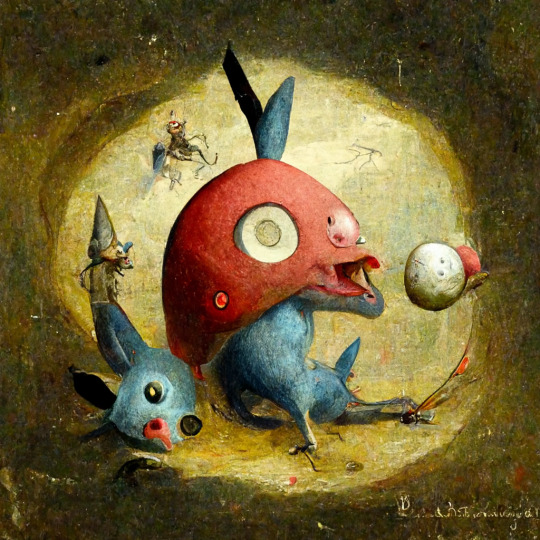
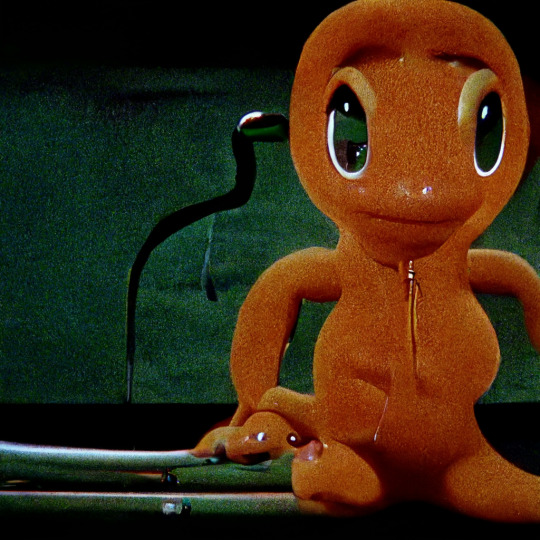
On the left, Hieronymus Bosch's Pokemon, on the right, Charmander on Gumby.
I did a much deeper breakdown of the "used AI" accusation here. It does not hold water.
Now, I could change my mind on this point if there were linked evidence to the creators of Palworld saying this. But there isn't.
Because the accusation is repeated in a tag, there's no way to include supporting information, or even to easily directly ask the accuser for it. Many people are going to see it, internalize it, and then repeat it uncritically, and that's how rumors and witchhunts start.
Because I've seen a lot of accusations about PalWorld stealing fakemon, and I'm yet to see a smoking gun. There's barely smoke.
Gonna hit the second point in that tag, but while we're on the theme of spreading misinfo:
Part 2 of the Tag: Using AI to Brainstorm is "Bad"
This is also an assertion that would require support, and I believe it to be wholly incorrect.
Plagiarism happens at publication. Not at inception, not inspiration, not even at the production level. The only measure of whether something is or is not "stolen art" is whether what comes out at the end replicates, with insufficient transformation, an existing, fixed expression. Art theft is about what comes out, not about what goes in.


For more about how this works with AI art, I suggest checking out the Electronic Frontier Foundation's statement on the issue. They're the ones looking out for your online civil rights, and I agree with their position on this.
The argument that AI art is theft because it is trained on public-facing material on the internet just doesn't fly. Those are all fixed published works subject to inspiration, study, and transformative recreation under fair use. The utilization of mechanical apparatus does not change that principle.
And fair use that requires permission isn't fair use. That's a license.
Moreover, altering the process to put infringement at inspiration/input or allowing the copyrighting of styles would be the end of art as we know it.
There's no coincidence that the main legal push against AI art on copyright grounds is backed by Adobe and Disney. Adobe is already using AI art as a pretext to lobby congress to let them copyright styles, and Disney owns enough material on its own to produce a dataset that would let them do all the AI they'd ever need to, entirely with material they "own." And they're DOING THAT.
The genie is out of the bottle, they (Disney, Adobe, Warner Bros, Universal) have it, and it can't be taken away from them. They just don't want anyone else using AI to compete with them.
Palworld didn't use AI to conceive of its critters. If it had, they'd have probably been less derivative.
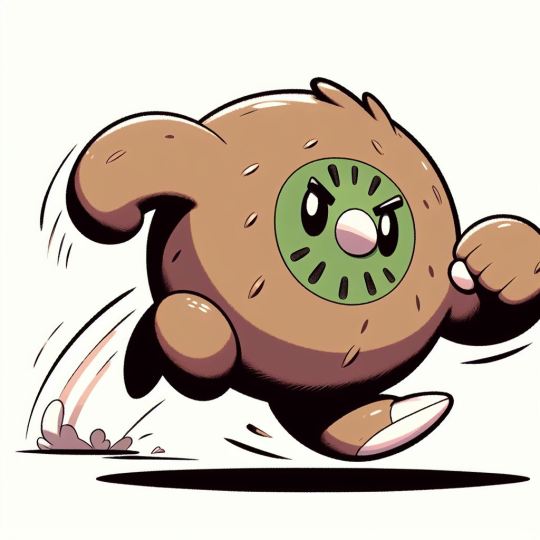


(three random AI fakemon I prompted up as examples of just that)
Both traditional and AI-assisted art can plagerize or be original, its entirely based upon how the techniques are used.
Moreover, you can infringe entirely accidentally without realizing, but you can also fail at copying enough that it becomes a new protected work.
We're well into moral panic territory with AI in general, and there's more than a touch of it around Palworld, largely because people aren't suspicious enough of information that confirms their worldview.
I used the quoted set of tags as the prompt for the top of the post, all the AI images in this post are unmodified and were not extensively guided, and thus do not meet the minimal expression threshold and should be considered in the public domain.
#palworld#palworld discourse#AI discourse#AI art#fair use#public domain#creativity#copyright#plagiarism#what is art?#midjourney#bing image creator
63 notes
·
View notes
Note
hi riley! read this recently and would love to get ur perspective on this as a YA author https://tinyletter.com/misshelved/letters/did-twitter-break-ya-misshelved-6
hi anon! yeah, i read this the day it was posted. thoughts/supplementary essay below.
firstly, i'd put a big "I AGREE" stamp across this essay. i think it's well-cited and thoughtful, and i agree with pretty much everything in it. i especially appreciate it for introducing me to the terms "context collapse" and "morally motivated networked harassment" - seeing internet sociology studied and labeled is ... odd, but useful.
i left twitter in 2017, but i keep an eye on things, which seem similar now to the way they were four years ago. the essay describes the never-ending scrutiny, the need to seem perfect, and the pressure on writers to out themselves. all of that is spot-on. twitter is an outing machine. there is so much harassment and anger on the platform that in serious conversations, good-faith engagement becomes something that must be earned, rather than something that's expected. and in order to earn good faith, strangers expect you to offer up an all-access pass to who you are. otherwise, things might take a swift left turn into verbal abuse.
obviously twitter is a cesspit of harassment from racist, homophobic, and transphobic people, but i think the most painful harassment comes from within the community. i, and most people i know, wouldn't give a single minuscule little fuck if ben shapiro's entire army of ghouls came after us and told us we were destroying the sacred values of Old America or whatever. but the community at large does care about issues of racial justice and queer liberation and economic justice. which is why it's painful to see this supposed "community" eating its own over and over again.
how cruel can we be to people and pretend that we are their friends? that's the emotional crux of the essay to me. what we're doing to ourselves - people who do share our values and want to achieve the same goals - because this one platform is built on rewarding the quickest, most brutal, and most public response.
god forbid you don't have your identity figured out. god forbid you have an invisible disability, or are writing a story about something sensitive you've personally experienced but had an off-consensus reaction to. on twitter, if you are not a paragon of absolute and immediate clarity, you may as well be lower than dirt morally, because you're unable to do what the platform requires of you: air every private corner of your identity, up to and including your trauma, to justify not only your everyday actions and opinions but also your art.
(this is all honestly incompatible with interesting art, but i'll get to that in a bit.)
it doesn't take a genius to see how troubling this environment is when combined with twitter as a marketing tool. i remember that around the time of my debut, i'd tweet out threads of private, painful, personal stuff, which felt terrible to recount, but i'd watch the like count increase with this sense of catholic, confessional satisfaction. all of this was tied to the idea of my potential salability as a writer.
i was around 21 at the time. i felt a lot of pressure as a debut. i wanted people to like me and think i was exceptionally mature and confident. i wanted to do my job and build buzz for my book. i saw that all these publishing professionals and authors spent day in, day out angry and exhausted on twitter. every few days, a new person fifteen years older than me would say, "i can't take this anymore, i'm so fucking tired of this, i'm logging off for a while." i thought, well, this must be how online activism feels: like running on a sprained ankle.
i can still remember book after book after book that inspired blow-ups, big explanations, and simmering resentment: carve the mark (whose author was forced to admit that she suffered chronic pain after relentless criticism of that element), the black witch (a book explicitly about unlearning racism that was criticized for depicting ... racism), ramona blue (a book about a bi girl who thinks she's a lesbian but winds up in an m/f relationship, because she's still discovering her identity) ... etc
each book, each incident, followed the same pattern. firestorms of anger, a decision of where to place blame, the desperate need for a single consensus opinion in the community. i think a lot of people on book twitter see these as bugs inherent to the platform, but really, in twitter's eyes, they're features. the angrier and more upset twitter's userbase is, the more reliant they are on the platform.
i wound up leaving around the time i realized that not only was twitter making me anxious - NOT being on twitter was beginning to make me anxious, because of vaguely dread-infused tweets all around like "i'm seeing an awful lot of people who are staying silent about X. ... why are so many people who are so loud about X so silent about Y?" etc.
that shit is beyond poisonous. people will not always be logged on. the absence of someone's agreement does not mean disagreement. actually, someone's absence is not inherently meaningful, because it is the internet and silence is everyone's default position; internet silence in all likelihood means that that person is out in the universe doing other things.
this is already a ridiculously long response, so i'll try to wrap up. firstly, i think that progressive writers and readers have GOT to stop thinking that a correct consensus opinion can exist on every piece of fiction, and on every issue in general, and that if someone diverges from that consensus, they're incorrectly progressive.
secondly, i think that progressive writers and readers have got to uncouple the idea of a "book with good politics" from a good book, because 1) there are books about morally grimy, despicable subjects that help us process the landscape of human behavior, and
2) if, in your fiction, there is only one set of allowed responses for your protagonist, you will write the same person over and over and over again. you see this a lot in religious fiction. the person is not a human being but an expression of the creator's moral alignment. (not entirely surprising that this similarity to religious correctness might crop up with the current state of the movement. i read this piece around the time i left twitter and it shook me really, really deeply.)
i understand that in YA, there's a sensation of immense pressure because people want to model good politics and correct behavior for kids. this is a noble idea - and maybe twitter is great for people who want to be role models. but i've become more and more staunchly against the idea of artist as role model. the role of the writer is not to be emulated but to write fiction. and the role of fiction is not to read like something delivered from a soapbox, or to display some scrubbed-clean universe where each wrong is immediately identified as a wrong, and where total morality is always glowing in the backdrop. it's to put something human on paper, and as human beings, we might aspire to total morality, but we fall short again and again. honestly, that's what being on twitter showed me more clearly than anything.
92 notes
·
View notes
Text
Feeling Deeply
Genre: Fluff so much fluff. Arranged Marriage fic.
Pairing: Namjoon x OC
A/N: Aaaaaa this is the first fic I'm posting ever ever. It's basically a way to follow the red thread of my desires. OC is named Brishti. She's Indian. She's Bengali & curvy & an introvert. This whole fic is 90% going to be a slow burn fluff fic about two introvert nerds getting to know each other. Seriously there's like hardly any real angst, maybe slight angst about okay when are these two going to bang - if you look very carefully but basically its just slooooow fluuuufff. Hopefully you all like it. Please let me know what you think.
Current Chapter: Remember this is all happening in the 1960s. OC & Namjoon are both really well off first gen immigrants. Nowhere is this the general representation of immigrant experience. Just a special exception because I want to write fluuuuffff. A bit of how this weird marriage took place. Lots of character details.
Previously in Feeling Deeply: Preface-ish
CHAPTER 1
The doorbell rang. Brishti got up to answer it. She handed the cheque to the movers. She was proud to have chipped in. Namjoon hadn’t had a problem with it. Brishti had tried really hard to react as though that was a very normal thing to have happened in a marriage (it wasn’t, not in the marriages she’d seen). Namjoon had taken part in picking out the furniture too - something that was always delegated to the woman. In fact, both of them had been clueless about how to decorate a home. All the same, they’d put together the basics. Today, they had received and unpacked all of their furniture - a two seater sofa, two tables - one for him, one for her & a set of four chairs. And a bed. It had been four days since the wedding.
“Brishti…” Namjoon sighed softly, without her knowing.
He seemed to be drunk on her beauty & her words. He was just noticing how her skin reminded him of the colour of the dark chestnut wood in the warmest evening glow.
Many of his relatives were upset he’d chosen a dark-skinned woman as his wife, a woman who was four years older nonetheless! He knew what the gossip-mongers would say, since he was one of the most eligible bachelors in their social circle, back home in Korea - ”She’s 30! Indian! I didn’t know the Kims had such bad money problems!” Even thinking about the snide comments they would be saying made him livid.
He was thankful his parents only wanted him to be happy. Happily married, that is. Happily single was not really an option. Only two weeks ago, Namjoon was approaching 27 and being severely pressured by his parents to get married soon. They were so tired of their son’s fickle mind that they were even prepared to accept a white woman for their daughter-in-law. When his parents heard about Brishti, they were overjoyed that she belonged to the same continent as Korea.
Namjoon would later learn the strange events that landed his would-be Indian bride in the pile of photos sent by his parent-appointed-official Korean matchmaker-cum-defacto-grandmother.
Brishti had avoided marriage like the plague & had tried to keep her freedom. So much so, the shame she’d brought on had forced her parents to cart her off with her brother to London, claiming they’d found a suitor for her there. And so it fell to Bikram, Brishti’s elder brother - who wanted to frolic in London while trying to be a lawyer - to get her married & send word (and a few photos) of his sister’s wedding as soon as possible.
To be in London, to be here in the swinging sixties, Brishti was happy as can be - she was freer here than she had ever been. She cut off her hair to a pixie-cut the first week of being here. Just this would have caused a month-long conflict at her home. Here, she could finally put to use the education she’d received intended as certificates for the trophy wife she was supposed to be. Here, she could dream.
When the novelty of the new place wore off a bit, Brishti missed the forest. She was from Bengal & had practically grown up in the Sunderbans. And that language, the language of forests, that was truly her mother-tongue. There, in the forest everything was equal. A mushroom & a tree, an elephant & an ant - all worked together to create something bigger than the sum of their parts. Out here in the human world, Brishti had noticed a lot more parasitic creatures.
There weren’t many forests in dreary London. Libraries, however, were aplenty. The next best thing was to be surrounded by books. Brishti began dreaming of a life around books. She wanted to work.
When she approached her brother about wanting to apply for an apprenticeship at The British Library, he scoffed at Brishti’s dream. So, a bargain was struck, Brishti would shut up and marry someone that would let her work (just wording it like that enraged her) in exchange for the permission and travel allowance to be an apprentice librarian at the British Library.
Bikram had rushed to his parent-assigned-defacto-Bangla-grandmother-cum-matchmaker but it seemed that she had been rushed to the hospital right before his arrival. Not willing to take any chances, Brishti’s brother had approached the only other matchmaker-cum-asian-grandmother in the building - Namjoon’s. It had taken him an hour and a bribe of 50 pounds to convince the halmeoni to include his ‘wrong-age, wrong-nationality, wrong-colour, wrong-figure, wrong-attitude’ sister’s photos in her pile.
Namjoon saw her in the pile of photos labelled ‘trash’ in Korean - the black and white photograph of Brishti, with the big bright black eyes. And the antics of a woman who clearly didn’t want to get married - she was huffing angrily in the picture, but was about to break into a smile, as if the photographer was teasing her, trying to ease her into taking her picture. There were three pictures, in one of which, Brishti was trying to swat the lens with the book in her hand. Namjoon had studied the picture carefully to find that the book she was reading was Anna Karenina. ‘How fitting’, he had thought then.
He’d told the matchmaker and his parents right away that this is the girl he wanted to meet - the first of all the photos ever shown to him. This was the one right he’d fought for with his parents - he gets to have the final say. His parents had agreed to let him have an almost-arranged marriage. Mostly because of how proud of him they were.
It irked him a little, how proud they were - of their son who had chosen to be a lawyer instead of his thirteen-year-old self’s dream - to be a poet. He knew they meant well. They meant for him to have a stable, settled life. He knew he was a grown man now, still, it scared him to think how they would react if they knew he still wrote poetry and intended to publish, someday, if he ever found someone he could actually read it to. That it was still his dream.
Namjoon got back to the present when Brishti said “Done!” as she handed Namjoon’s pen back to him. She smiled a little smile at him. He felt her smile getting warmer toward him since the first time he’d met her, over a week ago.
Wanting to keep the conversation going, Namjoon asked her, “Is there anything you’d like to ask me?” Half expecting her to ask - ‘How did you decide so soon that you wanted to marry me?’ or ‘Did you ever see me before we met?’ but she turned around to face him & simply asked a question he’d forgotten people could ask each other-
“How are you?”
Just then, it seemed like the universe had conspired for him to meet his dream again - A simple question that carried a hug. Namjoon smiled wide because he found himself married to a poem.
------------------------------------------------------------------------------
Oooooh god you read it?! Thank you so much! Please please let me know what you thought! Get into my messages about it! I would love nothing more than to hear what you felt about this!
#bts kim namjoon#fanfic#namjoon fluff#namjoon arranged marriage#namjoon x oc#arranged marriage#slow burn#slow burn fic#fluff fic#bts fanfic#bts#indian oc#red thread fics
38 notes
·
View notes
Text
Red String of Fate
Something a little different! Drabble lead + headcanons! I really like the idea of being connected to someone, so have this~
Also: very long, so I only did a few of the brothers. I tend to do them in order but I tried to jump around for variety’s sake since I published a partial post the other day.
Features: Lucifer, Mammon, and Asmo (short-ish, but for a reason. Makes sense when you read the lead-up),
I have to get to bed. Need to get up early for studying + a morning class. Really love this idea so I’ll be working on something unique for the rest of the bros :)
Casual conversations about soulmates and bad dates inspires Asmo to find your one true love. He swears up and down there’s a book that can do it. Being a lover of love and feeling like it’s his duty to see you off into the best of hands—the hands made to hold you!—he sets out to find the book. Legend says Cupid pricked his finger while writing out love lists with his enchanted quill and threw the dirty pages away, deeming them unusable. Instead of being discarded, they were salvaged by another and turned into a book that would answer any love-related question the reader had.
All it would cost is a drop of blood.
Cupid, who was very serious about his task of uniting hearts and forging bonds, felt insulted by the book. He felt cheapened and could not see the joy it would bring before his arrow was destined to arrive. In a fit of rage he threw it from the heavens, assuming it would disintegrate before landing in another’s hands.
He was wrong.
The book circulated for centuries, making its way through humble and haughty, poor and princely. Some say it even inspired the most romantic of playwrights. It was kept by a family of matchmakers for generations before their home was pillaged and burned by a spurned heart. Traded out of guilt or in a desperate moment for silver or food (Asmo didn’t remember which), it ended up in the hands of a scholar. He sat with his crush and read the book, the two asking it hundreds of questions and finding themselves quite content with each other.
After the two got married, they were convinced it was a lucky charm of sorts and passed it along to their friends. Once those friends found their true loves, it started a chain of giving. When one family had all of their children married off, they would pass the book on to someone else. The book spent a fair amount of time collecting dust when one person lost their soulmate too soon and didn’t open it for about five years, convinced it would stay blank. A new love came into their life and they were so moved by the magic, by the joy, that they donated the book to a thrift shop.
Asmodeus lost the history after the thrift shop. Too many people went in and out of it, too much time had passed. All he knew is that it ended up in the hands of a witch who made serious money off of love potions and romantic divinations. One of her grandchildren—a quarter succubus and three-quarters human—had donated it to RAD’s library.
He should’ve just texted his friends about the damn thing instead of researching it like Levi does his events. Should he be proud of all the effort? You could be, but he was kind of put off by all the work. It was shabby and beaten, hardly bigger than a typical planner. Definitely unassuming and definitely looked like it’d seen some things. Asmodeus was expecting something gorgeously gilded and velvet.
Hopefully a peek into your future would make up for all the disappointment. “I bet it’s me.” he touched a finger to his soft lips with a giddy smile, little ring glinting in the light. He practically skipped out of the library and back to the House of Lamentation. At the very least, he’d get to go on and on about how he found it and how grateful you should be that he cares for you so much to do so!
Asmodeus whisks you away into his room, the bed already set with pillows that were both aesthetic and luxurious. Nothing too out of the norm for him, but he wanted something that complimented the romantic undertones of this little endeavor. He coddled the two of you in a plush pink blanket before cracking it open and guiding your finger along the edge of the page. The red soaked in, ink blossoming in a faint pink that turned a brilliant scarlet.
The book grew warm, almost burning as the scarlet began to sear and shimmer on the page. You heard him hiss and grabbed the book as he started to squirm and scoot out from under it. You’d barely grabbed the book when pinky-red smoke exploded violently in your face. It didn’t burn or have a taste but it was surprisingly thick.
“What? No names!” Asmodeus had finally swatted away enough of the smoke to see a blank book. “It’s supposed to be names!” he scowled, kittenish fangs threatening to poke at his lower lip.
“Maybe there’s been a revision,” you blinked distractedly, talking more to yourself than him. Nope, still there. You wagged your finger at Asmodeus, showing off the bright red string tied around it.
His oncoming rant receded immediately, eyes shining a gorgeous and unmistakable pink. “Let’s see where it goes!”
To Lucifer:
He’s in the middle of doing paperwork (shocker) when he finds a vibrant red string tangling in his pen and catching on the lines
Tries to shake it off (very undignified, glad no one saw it)
Puts his pen down to pick at it and untie it. When that doesn’t work, he slips the opposite glove off with his teeth and lets his demon aura come out just enough to turn his fingernails into claws
That didn’t work either
Physically tries to pull the string off and begrudgingly stops when he realizes his finger might come off first
A huffy, annoyed man
Takes an awkward pic with his D.D.D and sends it to Diavolo, wanting to know if it’s a prank
Diavolo swears it’s not and Barbatos suggests it could be the red string theory, that thing some humans believe in.
Could it be true? Does he have a soulmate? Could he, being a fallen angel? Demons had soul mates?
All the questions swirl and he just leans back in his fancy padded chair to absorb it all. There’s something beautifully sad and...comforting...at the thought of demons having a soulmate, someone made just for them
Lucifer doesn’t really think that a soulmate’s at the end of the string, but he tells himself it’s a walk for the sake of his health, to stretch, and sets off to find the string
The eldest is quite surprised to run into you and Asmo, the string clearly tied around your finger.
“A bit overboard, don’t you think, Asmo?” Lucifer’s a little aggravated by it. What is this, a set up?!
His little brother swears against it, holding up a beaten book not even Mammon would waste money on.
Apparently, the string disappears when the soulmates touch their fingers together. Lucifer rolls his eyes and tries to soften his scowl as he presses his finger to yours.
You’re both surprised when the string thickens until it resembles a ribbon, kinking in the shape of a heart before disappearing in a burst of pinky-red smoke that has your fingers tingling
Lucifer says nothing, silently stunned and heart yearning at the tingling in his finger. It’s warm, like your love.
To Mammon:
IS IT ONE OF THE WITCHES?! IS THIS A TRACKER?!
First reaction: “OI! What the hell?!”
Also shakes his finger
Immediate second reaction is to chew on it and try to get it off
Ends up sucking on his tender finger like a baby because he basically chewed on himself instead of the string
Texted all the sorcerers and witches he knew. They all deny hexing him or mentioning him in potion-making.
He’s surprised to find he can still move around with the string. It’s not straining or limiting him, so he goes in his closet of magical seals, peeling a few back to reveal a sizeable hoard of stuff he’d stolen over the centuries (including some stuff he had on him from the Fall).
He tries daggers of all sizes and types. They don’t cut the string, either
When nothing seems to work, he marches towards the source, wrapping it around his fist with a grumble.
He pulls on it at random just because it’s a minor inconvenience and he couldn’t get it off.
Mammon notice that it runs under Asmo’s door and he yanks on it really hard, hoping he’s tearing thread off of a sweater or something. Annoying ass little brother!
When you yelp he freezes. Brain hasn’t quite kicked in yet and he yanks it again to check the reaction. Another yelp, and a thick thud behind the door.
Sounds like you’re involved somehow. Oops.
Turns out you had a hard time coming out of the room because he wound the string too quick (and weren’t strong enough to tug it back to yourself)
Asmo’s in the middle of lecturing him as he squishes your poor little face, scowling and lamenting that MAMMON is your soulmate. MAMMON, of all people, who’d been smacking you against a door for the last few minutes!
Now Mammon’s interested and needs the story
Gets a biiiig shit-eating grin when he realizes what’s happened.
Takes your hand with his usual fanfare of ‘’Course I would be! I’m their MAIN man! Their BEST man!”
The string seems to tie your hands together for a brief moment before exploding in a burst of smoke and Mammon’s still grinning like an idiot.
He doesn’t let go of your hand
To Asmodeus:
He’s waving that smoke away when he feels a new, subtle weight on his finger
Whatever it is, it’s flitting and ticklish. He can feel it catching on some of the fashion rings he wears
Asmodeus doesn’t know whether he wants to purr or squeal. He did something that hurt your human ears though.
Didn’t realize it hurt your ears until after the noise bottoms out to a lower pitch, and immediately cups his hands over yours ears, sliding them up into your hair while he showers the crown of your head in apology kisses.
Makes a video clip to send to the bros in a group chat and has to redo it several times because they can’t really hear his words over the smug purring and clicking
It warms his heart to know he has a real soulmate. Asmodeus really struggles with the concept of genuine, non-sexual love.
He figured the most he could ever get was platonic love or brotherly love, but this is a whole new thing for him and he’s honestly blown away
For a brief moment he feels like Heaven’s Jewel again, so treasured and special. It almost makes him cry
He’s lowkey crying.
100% takes advantage of the fact that your fingers are tied together until you touch fingertips. You guys giggle quietly and cuddle close as he loops the string around his finger so you put your arm around his neck
“You don’t need a string to make me touch you, you know.” you tease him, wrinkling your nose in that cute human way you have
“I know,” Asmo gives you an Eskimo kiss that turns into a few butterfly kisses on your mouth, leaning over you and into you.
Totally uses the string as an excuse to cuddle you and turn down any activities the bros want you to go to. (”Can’t, they’re kind of tied up.”)
Let this baby bask in his sure thing, okay? He really needs it, and you know he’s good for it
Gives you hand kisses and cuddles into you
Gets the bright idea to try to bottle the smoke that’ll erupt when you touch fingertips. Sacrifices his most beautiful perfume bottle to immortalize this moment
Catches the littlest bit, so thin that he has to hold it up to the light to see it.
Complains about probably swallowing most of it during that attempt
Is now even more shameless about demanding his cuddles and attention because you guys are destined lovers.
330 notes
·
View notes
Text
5 Lessons I Learned Writing a Book in a Pandemic

This year has presented us all with unexpected obstacles and challenges—not the least of which is a global pandemic. Today, author Uju Asika talks about what she learned in the process of writing and publishing a book this year:
As the author of Bringing Up Race: How to Raise a Kind Child in a Prejudiced World, which was published in September, one question people ask me is, “How on earth did you manage to write a book in a pandemic?”
I submitted the first draft of the manuscript 12 days before the UK went into lockdown, but I still had weeks of drafting, cutting and revising left to do.
Being a NaNoWriMo winner in 2018 (whoop whoop!), I was used to churning out words at speed. But this was a work of nonfiction involving interviews, studies and checking sources. Also the topic was both deeply personal and hugely important. I couldn’t just wing it. Here are 5 lessons I learned in the process of writing a book during a pandemic:
Lesson 1: It’s Ok to Freak Out
I spent the first weeks of the pandemic scrolling news feeds 24-7 and becoming an amateur epidemiologist via the School of Google. Similarly, when I started writing the book, I lost entire days to ‘research’ (aka Facebook). I felt like a fraud, a sham, a big fat failure. Who told me I could write an entire book? Why did I think this was a good idea? Now I realize this was all completely normal. Freaking out is part of the process. Whether you are taking on a huge, scary project or a global outbreak, you are entitled to lose your shit at least for a bit.
Lesson 2: Take Regular Breaks
As a writer, once you’re disciplined enough to keep ‘butt in chair’, you might find yourself suffering sciatica, eye strain and other ailments. Likewise, if you don’t switch off from Trump tweets and Boris briefings, it can mess with your mind. Taking breaks is essential, both for your sanity and to replenish your creative well. You don’t have to go on a marathon hike or visit a remote island. Try a stroll around your neighborhood or an evening with Netflix instead of your laptop. (Just don’t use Netflix as an excuse to stop writing.)
Lesson 3: Pace Yourself
At the start of the pandemic, several world leaders claimed it would be over soon. However, common sense, instinct, and science says we are in it for the long haul. So don’t burn through those store cupboard recipes and homeschooling hacks. Equally, don’t try to write a book in one stretch (although you can do it in a month if you’re crazy enough). Set smaller goals like a daily word count or a timed writing session. Writing apps like Scrivener are great for helping you stay on track.
Lesson 4: The Only Way Out is Through
This sounds like the theme song from a disaster movie (apt for 2020) but it’s true. Whether tackling a creative venture or a crisis, the only way out is through. There are times you’ll want to turn back or give up entirely. But the best option is to keep moving forward until you see that glimmer of light at the other end. I used to fantasize about holding the finished book in my hand. But the only way to get there was to stop fantasizing and get to work. Or to paraphrase Finding Dory, just keep that ink swimming.
Lesson 5: The Magic is in the Edit
Ask any author, most of us would rather extract teeth than remove precious words from our manuscripts. However, something magical happens in the edit. Ideas that began as loose threads weave into shape. Your work is better for what you choose to keep and what you’re willing to let go. Some call 2020 a giant reset. I think it’s a giant edit. We are letting go of what no longer serves us. Discovering what truly matters and cutting out the other crap. It is painful on many fronts but I do believe we will emerge stronger, tighter and clearer for it.
I hope these lessons are useful to anyone attempting to write through difficult times. It’s ok to freak out, whether on the page or in real life. Take regular breaks both from writing and from world news. Pace yourself but keep moving forward because the only way out is putting one foot (or word) after another. And don’t worry if your project/home/life in general feels ridiculously messy right now. The magic is in the edit.

Uju Asika is a multiple award-nominated blogger, screenwriter and digital consultant. She is the author of Bringing Up Race: How to Raise a Kind Child in a Prejudiced World, published in September 2020 by Yellow Kite (Hachette). Buy the book on Amazon UK, Waterstones, Word on the Water (delivery to North America and Europe) and other good bookshops.
Author photo by Storm Davison.
129 notes
·
View notes
Text
Thanks to @onereyofstarlight for the tag!
1. What fandoms have you written for?
This is embarrassing but I actually had to look at both FFnet and AO3 because I couldn’t remember all of them. TRON: Legacy, Assassin’s Creed, Star Wars, Lord of the Rings and the Hobbit, Sherlock, Final Fantasy VII and XV and Kingsglaive, Voltron: Legendary Defender, Merlin, Skyrim, and, of course, Thunderbirds. I have a couple other fandoms that crop up in various wips, including a Tom Swift/Thunderbirds crossover that I really should finish.
2. How many works do you have on AO3 &/or FFNet?
FFnet has 45, and AO3 has 41. There’s also a couple stories lurking on tumblr, notably a final chapter for Reflection.
3. What are your top 3 fics by kudos on A03 &/or Favs on FFNet?
AO3 dominates in this area, if I can use a word like “dominates” for stories that have less than 125 kudos each haha. Oh well, the numbers don’t matter!
1. 118 kudos on tell the shades apart (my world is black and white)
2. 94 kudos on Reflection
3. 91 kudos on The 43rd Hour
4. Which 3 fics have the least kudos & Favs?
Again on AO3:
1 kudos on I Am You (And You Are Me)
5 kudos on The Dragonborn Chronicles
6 kudos on cynosure
5. Which Fic has the most comments and which has the least?
Reflection has the most at 29 threads, and I Am You (And You Are Me) has the least at zero.
6. Which complete fic do you wish had gotten more attention?
Lodestar, definitely. Sure, it’s for something of a rarepair, but they aren’t that rare, and I just really really like the way the story came together. On the other hand, of course my unfinished Merlin fic has gotten probably the most attention, because that’s just the way it goes, eh?
7. Have you written any crossovers?
None that I’ve published! I have various crossovers lurking in mostly unfinished states, including the aforementioned Tom Swift/Thunderbirds crossover, and an Assassin’s Creed/Thundeerbirds crossover that is very good and I should also finish. There’s an Expanse/Thunderbirds fic lurking in my brain that I may or may not ever commit to paper, who knows. I’ve also very vaguely toyed with a Batman/Thunderbirds crossover, in the sense that “nebulous” is too strong a word for the kind of toying I’ve been doing.
8. What is the craziest fic you’ve written?
I don’t really write crazy or crack or humor in general, so probably the closest thing to “crazy” is On the Lam, which was the result of wanting to throw Scott and Penelope toward an Egyptian stud farm. It ended up being the host for a bad joke about that, courtesy of one @thebaconsandwichofregret, who consistently gives some of the best dialogue advice I’ve ever encountered.
Actually, the true answer is probably a chapter in Glimpses into a Supernova, maybe the one about blood? It seems bonkers when I think back on it now, but I admittedly haven’t read it in many years. Possibly I am misremembering. Glimpses has some weird ones, though.
9. What’s the fic you’ve written with the saddest ending?
It’s a tossup between The Painting and a place where the water touches the sky. The former deals with a prior off-screen death; the latter is (maybe??) an on-screen death. People seemed upset by it, at any rate. I said it was ambiguous!
10. What’s the fic you’ve written with the happiest ending?
“Happy” is probably a matter of perspective? Depends on the overall reading experience and the ending within that context. Either septet or Three Towels and a Tracy, they’re both pretty fluffy overall.
11. What is your smuttiest fic?
protoinstincts, which I completely forgot I wrote and then rediscovered like a year later and realized “hey, this is actually pretty good” and you know what, despite it not being overly spicy, it is pretty good.
12. Have you ever received hate on a fic?
Not hate, per se, but someone left a review on Less Than Nothing saying they “didn’t like” that I “wrote the story as a series of drabbles.” Cool, I didn’t write the story for you, random guest reader, and the back button exists, friend 😂 It didn’t bother me on a personal level because I wrote the fic for an audience of one (incidentally, not myself and rather the recipient of a secret santa event), but I was mad because the reviewer had no way of knowing where I was at as a writer, and I know from longtime observation how that kind of comment can crush less experienced or confident writers.
Don’t leave flames, kids, you don’t understand the power your words have. Don’t like, don’t read.
13. What is the nicest comment you’ve received?
The nicest? Goodness. Hmm. I’d have to go hunting to find the nicest, but in recent memory, @ayzrules sent me a couple passages from Spanish texts she’s been studying that reminded her of my writing, and I was honestly so touched by the fact that she even thought to make such comparisons, much less mention them to me. Taking the time to familiarize yourself with someone’s style until you can make comparisons between it and someone else’s work is so much more meaningful to me personally than a basic “Nice story!” or “Loved this!” type of comment ever could be. <3 Ayz <3
14. Have you ever had a fic stolen?
Not that I’m aware of, but I’ve never gone looking on any sort of copycat site or whatever either.
15. How many fics do you have marked as incomplete?
Two. First is The Dragonborn Chronicles, which is a retelling of Skyrim from Lydia’s perspective via her journal, to complement the in-game journal. It’s a slog of a style to write, though, even for someone who loves writing first person and doesn’t really want to write a lot of dialogue, and the outline is huge, and the story will be many times more huge, and just. Some day. Some day.
Second is tell the shades apart (my world is black and white), which has always been unfinished because the outline itself is over seven thousand words and the fully written story would undoubtedly land between 100,000 and 200,000 words, and there’s no way I’m writing that. I’ve always meant to upload the outline, but I got kind of self-conscious about the way I formatted it, and ugh I just haven’t bothered. One day, one day, right?
Moral of the story is I’m intensely a short story writer, and I’ve really found myself settling into that role over the last couple years. Better a clipped, punchy short story than a bloated slog of an epic.
16. Which of the WIPS will most likely be finished first?
Literally no one knows that. I wrote 95% of the observable entropy of a closed system over five years ago, and then I proceeded to pull it out roughly once a year and write and rewrite various endings until last month, which was when I finally figured out how I wanted to end the story. septet, too, languished for about five years before I finally remembered it existed and managed to wrangle an ending. Endings are hard, man. So are those third plot points. Terrible creatures, those, bog me down every time.
17. Which WIP are you looking forward to finishing?
Uh... mm. See. If I were looking forward to finishing any of them, I’d be actively working on them. At this moment, writing fic isn’t exactly high on my list of priorities, but I am also coming off a four-day idle game bender, so I still feel like I haven’t quite reengaged with myself as a living person. Give me another few days and I might have an answer.
(I am always most looking forward to finishing this ridiculous Ignis-drives-the-Audi-R8 fic that’s been languishing in my wips for literal years. As mentioned above, third plot points. Killer, man.)
(oh and also the working-titled the art of murder. Scott and Penny attend a private art auction. Things don’t go to plan. It, too, is stuck at the third plot point. I know, I know I have a problem, shush.)
18. Is there a WIP that you’re considering abandoning?
Any wip has the potential to be revived—this year and the old wips I’ve unearthed, dusted off, finished, and posted have been proof of that. I don’t intentionally permanently abandon anything for that reason, some stories just probably will remain dusty old wips forever because I didn’t actually need or want to write the full story for one reason or another.
19. Which complete fic would you consider rewriting?
Now that’s an interesting question. Hmm! Honestly? None of them. Once I finish a story, I’m not inclined toward rereading it again any time soon, to the point of years in some cases, and I feel like I’ve moved on from the stories I wrote one, two, five, eight years ago in the actual writing sense. They’re finished stories, and on top of that are relics of their time, which doesn’t mean the stories don’t have any ongoing significance on a reading level—I just don’t have any interest in rewriting those particular stories. I’ve gotten them out of my head, to the point of not remembering at least a third of them on demand anymore, and I don’t have any desire to “retell” those exact stories. I do tend to tighten the wording and fix perceived errors/weaknesses whenever I do end up rereading an old story, and I usually silently update the AO3 version if I make any significant changes because AO3 makes it a breeze to update a posted fic. I might do FFnet too if I’m feeling up to it or have the time.
20. Which complete fic is your favourite?
Once upon a time I would’ve said Holding On, but I honestly find it kind of unbearably melodramatic now. the observable entropy of a closed system is equally melodramatic, as it was written in the same era, but at least it has the excuse of being told in second person and via a style that is a half step away from being poetry. Possibly I will reread it in a few years and find it equally obnoxious and overly dramatic, but it received some shockingly positive comments, which I wasn’t expecting at ALL, and I’ve been honestly blown away by the amount of praise it’s received. <3 to everyone who’s said anything about it!
21. What’s your total published word count?
141,000 on AO3, 160,000 on FFnet, but technically the light of my life SS wrote fifty thousand words of each. It’s too late for math.
I tag @velkynkarma, @lurkinglurkerwholurks, @writtenbyrain, @thebaconsandwichofregret, and anyone else who wants to play!
6 notes
·
View notes
Text
thoughts on AO3 from a content moderation researcher
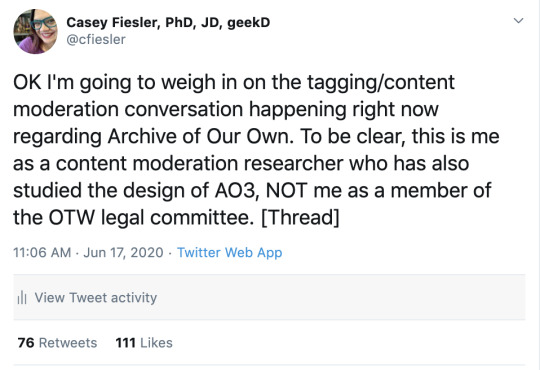
A few days ago I tweeted some thoughts about current conversations around content moderation and racism on AO3. I thought I’d reproduce here:
OK I'm going to weigh in on the tagging/content moderation conversation happening right now regarding Archive of Our Own. To be clear, this is me as a content moderation researcher who has also studied the design of AO3, NOT me as a member of the OTW legal committee.
To clarify the issue for folks: Racism is a problem in fandom. In addition to other philosophical and structural things regarding OTW, there have been suggestions for adding required content warnings or other mechanisms to deal with racism in stories posted to the archive.
Here's a description of the content warning system from a paper I published about the design of AO3, in which I used this as an example of designing to mitigate the value tension of inclusivity versus safety:
“Knowing that this tension would exist, and wanting to protect users from being triggered or stumbling across content they did not want to see, AO3 added required warnings for stories. These include graphic violence, major character death, rape, and underage sex. These warnings were chosen based on conventions at the time, what fan fiction writers already tended to warn for when posting stories elsewhere. Warnings are not only required, but are part of a visual display that shows up in search results. One early concern was that requiring these warnings might necessitate spoilers—for example, telling the reader ahead of time that there was a major character death. Therefore, AO3 added an additional warning tag: ‘Choose not to use archive warnings.’ Seeing this tag in search results essentially means ‘read at your own risk.’ Most interviewees found this to be a solution that did a good job at taking into account different kinds of needs."
The idea is certain kinds of objectionable content is allowed to be there as long as it's properly labeled. Content will not be removed for having X, but it can be removed for not being tagged properly for having X. This allows users to not have to see content labeled with X.
My students and I have studied content moderation systems in a number of contexts, including on Reddit and Discord, and I actually think that this system is kind of elegant and other platforms can learn from it. That said, it relies on strong social norms to work.
One of the big problems with content moderation is that not everyone has the same definition of what constitutes a rule violation. Like... folks on a feminist hashtag almost certainly have a different definition of what constitutes "harassment" than on the gg hashtag.
A few years ago we analyzed harassment policies on a bunch of different platforms and usually it's just like "don't harass people" but okay what does that mean? I guarantee you there are people on twitter who think rape threats aren't harassment.
So a nice thing about communities moderating themselves--like on subreddits--is that they can create their own rules and have a shared understanding of what they mean (here’s a paper about rules on Reddit). So you can have a rule about harassment and within your community know what that means.
I've talked for a long time about the strong social norms in fandom and how this has allowed in particular for really effective self regulation around copyright. In fact I wrote about this really recently based on interviews conducted in 2014. HOWEVER -
Generally, I think social norms are not as strong in fandom as they used to be, in part because it's just gotten bigger and there are more people and also some generational differences and we're more spread out. (My PhD advisee) Brianna & I wrote about this for TWC.
So the point here is that without those very strong shared norms, definitions differ - across sub-fandoms, across platforms, across people. Whether that thing we're defining is commercialism, harassment, or racism.
This isn't to say that there *shouldn't* be a required content warning for racism in fics, but I think it's important to be aware how wrought enforcement will be because no matter how it is defined, a subset of fandom will not agree with that definition.
That said, design decisions like this are statements. When AO3 chose the required warnings, it was a statement about what types of content it is important to protect the community from. I would personally support a values-based decision that racism falls into that category.
Design also *influences* values. An example of this was AO3's decision to include the "inspired by" tag which directly signaled (through design) that remixing fics without explicit permission was okay. Another quote from the paper:
“Similarly, Naomi described a policy decision of AO3 that was a deliberate attempt to influence a value. Prior work understanding fandom norms towards re-use of content has shown something of a disconnect, with different standards for different types of work [15,16]. Surprisingly, although fan authors themselves are building on others’ work, some don’t want people to remix their remixes. In Naomi’s original blog post, there is some argument between fans about what AO3 should do about this, with suggestions for providing a mechanism for fan writers to give permission for remixing. Naomi described their ultimate design, and feels that in the time that has followed the creation of AO3, the values of the community have actually shifted to be more accepting of this practice:
���We had baked in right from the beginning that you could post a work to the archive that was a remix, or sequel, or translation, or a podfic or whatever, based on another work, another fannish work. As long as you gave credit, you didn’t need permission. In fact, we built a system into the archive where it notifies [the original author]. That was because we were coming from a philosophy where what we’re doing is fair use. It’s legal. We are making transformative work. We don’t need permission from the original copyright holder. That’s why fanfic is legitimate. But what’s sauce for the goose is sauce for the gander… So, I think that’s an example, actually, where archive and OTW almost got a little bit ahead of the curve, got a little bit ahead of the broader community’s internal values. That was a deliberate concerted decision on our part.’”
A design change to AO3 that forces consideration of whether there is racism in a story you're posting could have an impact on the overall values of the community by signaling that this consideration is necessary AND that you should be thinking of a community definition of racism.
Also important: content moderation has the potential to be abused. And I know that this happens in fandom, even around something as innocuous as copyright, since I've heard stories of harassment-based DMCA takedown campaigns.
There's a LOT of tension in fandom around public shaming as a norm enforcement mechanism, and I would want to see this feature used as a "gentle reminder" and not a way to drum people out of fandom. (See more about that in this paper.)
That said, I think these reminders are needed. There will be a LOT of "uh I didn't know that was racist" and that requires some education. Which is important but also an additional burden on volunteer moderators who may be grappling with this themselves.
This is more a thread of cautions than solutions, unfortunately. Because before there can be solutions, we need: (1) an answer to a very hard question, which is "what is racism in fanfiction/fandom?" and this answer needs to come from a diverse group of stakeholders, and (2) a solution for enforcement/moderation that both makes sure that folks directly impacted by racism are involved AND that we're not asking for burdensome labor from already marginalized groups.
All of this comes down to: Content moderation is HARD for so many reasons, both on huge platforms and in communities. AO3 is kind of a unique case with its own problems but I am optimistic about solutions because so many people care about the values in fandom.
I’m still thinking about this and welcome others’ thoughts!
192 notes
·
View notes
Text
Here’s some more worldbuilding questions answered about Wizard Story. Some of the details might need to change in the future. I couldn’t publish these before because there were slight spoilers, but I think we’re past that part now, and I can post the answers:
Let me first explain the Enclave:
So the Enclave is a little independent country inside the Queen’s country sort of like the enclave that is Vatican City. I might need to come up with a name to call it because “Enclave” is kind of just descriptive.
The wizards formed their own little nation to have more of a say in things in the feudal system. So in a normal feudal system there is the king who rules and can call on people to fight in wars, and there was the Church that acted independently, and exerted influence. In this world there are at least two groups independent of the king - the clerics who worship the gods, and the wizards who follow their own path. The only reason why some dark wizard hasn’t taken over the world is because of the clerics, and the only reason why the world isn’t a theocracy dedicated to one god, ruled by a cleric-king, is because of the wizards. The two powers balance each other. There may be more factions but I have not been informed about them. There are at least, besides the three elven kingdoms, another faction of dark and demonic hellish forces in the world.
The country the enclave is within is the as-yet-unnamed one Queen Grecia rules. So this queen is taken a little more seriously, just as a matter of courtesy. The status of being Court Enchanter/Court Wizard to this queen is seen as equal or even superior to the head of the Enclave. Wizard was extremely, horrifically young when he earned the title Court Wizard. It happened at the same time as when he passed the wizard test.
The wizards are mostly independent from each other and they’re usually annoying and mistrustful of systematic rules or cooperation. The enclave is a sort of Monastery with a huge library.
The library at the enclave: It’s a sort of miracle that a few wizards a long time ago decided that they should pool their books together in a library. That library was spelled so that the books would kill anyone who tried to take them out of the room they’re in, and some wizards started living together, usually pretty far apart from each other but in the same big monastery-like building, just for that convenience. But the wizards, because they’re shitty and hoard power, mess up the book catalogue on purpose and hide some books so that only they’ll know where to find them. The more cooperative wizards get together in a meeting about it at least twice a year, but nothing is ever done about it. It’s amazing that the library’s there at all. There’s a stigma about not owning your own books. A wizard’s book collection goes to the enclave at death, that’s the only reason why the library works.
It’s grossly individualistic, but at the same time, it’s not lawless or completely boneheaded. There’s an order of the more social and cooperative wizards who answer delegations or requests from other countries, and who might even choose to punish certain wizards for violating taboo. But it’s a very loose organization.
But if some wizard is doing terrible things to another country, most wizards at the enclave are like “well that’s unfortunate, but what are we supposed to do about that? They’re just following their bliss” and so wizards are seen as horrible fiends by a lot of people. Normally those wizards acting out are spanked by clerics. I guess the name of the game is they’re all shitty wizards, and usually live in separate towers hundreds of miles from each other, but a few of the ones who aren’t complete monsters live in this monastery-like place.
Some of them happen to enjoy teaching and so some children get taught. But it’s more like an apprenticeship system. They must pass a test before being considered true wizards, not because wizards love systems, but because Weaving is incredibly, incredibly dangerous. Many people weave without being officially apprenticed to a wizard, by just following step-by-step instructions, but it’s scary. This is how you get stories of like... witches out in the countryside, just normal people hexing their neighbors.
Clerics and Wizards weave magic in the same basic system, but with some differences. A lot of the differences are actually in their approach to magic, and their general attitude toward it, and whether or not your personality is someone who would overthrow the gods or not, given the chance.
what daily life is like at the Enclave for the Enchanter
Enchanter has a household and a few servants. Normally, days are spent immersed in special interests and research in the library. If Enchanter is in need of money, they make very sought-after potions for high-paying customers, but Enchanter never interacts with the customers. They do it through special commission. Enchanter spends as little time making potions as possible, in order to spend all their time researching.
Do they teach?
Enchanter does not have an apprentice. Enchanter is a very angry and impatient person, but would answer some questions pretty cordially, because being asked questions about your special interest is flattering. But at this stage in life, Enchanter would be a bad teacher.
What is the social environment like?
Wizards aren’t the best company. It’s actually pretty lonely for Enchanter at the Enclave. The wizards at the enclave don’t eat together in a great hall or anything - they all have their own households. So it’s more like a little town where not everyone talks to each other, and you’d have to visit and bother a wizard in their own isolated household, so to speak, if you wanted to socialize. You can catch wizards in the library, but it’s generally accepted you don’t talk there. Sometimes, you speak to each other in meetings or in the hallways, but everyone is busy. This is part of why the Wizard Ball is really important to Enchanter, it’s like the one time everyone is specifically gathered to socialize. Wizard gets vastly more socialization than Enchanter does, and he lives at the constant party that is the court, so he doesn’t remember how isolated it is.
Does their medical expertise see a lot of practical use, or do they mostly do research?
Enchanter mostly does research and doesn’t heal very often. If another wizard gets hurt, Enchanter would be the one they go to, but other than that, they don’t.
Do people commission them directly for treatment, or is there a teaching hospital sort of situation?
Wizards are usually only hired by really rich people or royalty to do weavings. The reason why the Enchanter had to be “sent” to help the Wizard is because otherwise the Enchanter would have refused. But it’s common for Kings and queens to call for healing. Enchanter doesn’t run a healing practice for common people. Madame Irena is actually closer to what you’re thinking of. She is not a famous healer, but she is a much more significant impact on healing in her community. She makes potions that don’t work crazy well, but only so that they can be affordable to common people.
What does their professional competition look like (other than the wizard lol)?
The actual competition for Enchanter as a magical healer is other wizards who do healing, especially some of the older Enclave wizards who are good at a lot of things.... and also clerics, who can perform miracles with god threads. Now, it’s actually very very rare that the gods would intervene and add threads when a cleric asks, so normally a cleric is working with the same weaving structure that a wizard does. So it’s pretty direct competition, though the clerics are less scientific and rigorous about their research and study, following their instincts with weaving, so they have to depend more on the gods to not let things blow up in their hands. Some of the older wizards and especially the demons and elves at the enclave, are very skilled healers as well, because they have had time to learn different things. But Enchanter is known for single-mindedly studying this one subject of healing, and people gossip that it’s because they think the Enchanter can’t let it go, that Wizard was made court wizard over the Enchanter.
27 notes
·
View notes
Text
thought trade (i) // jjk
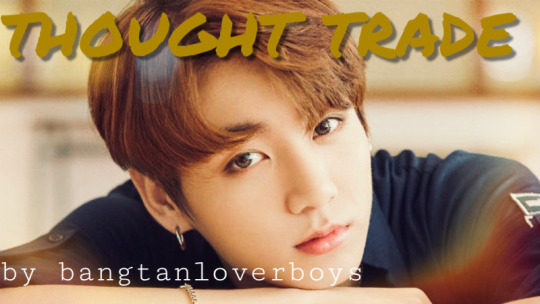
summary - In a world where soulmate systems exist, you get one of the strangest ones you can think of. You speak your soulmates thoughts without any regard for context and that’s your only hint. At first it’s a bit strange, as you start blurting out random Korean phrases and stuff but one day you get so fed up that you start cursing at the world for giving you the most useless systems there is. It isn’t until you check twitter and see that a certain K-Pop Idol is trending for a random outburst in English that’s your words. . .
pairing - idol!jungkook x gender neutral!reader
genre - fluff; soulmate au
word count - 4.2k
warnings - none
author’s note - the reader in this fic in gender neutral and when there’s italics it means they’re talking in korean. also this is the first story i’ve published publicly in 6 years, if you’ve noticed anything about this fic grammarwise, please tell me and i’ll correct it.
part ii

You honestly don’t know what you expected when you turned 20 as you awaited for your soulmate system to show. Most common it was tattoos that showed up, your soulmates first words or birthdays. The lucky ones got to share thoughts or perhaps even see each other in dreams but none of that happened to you. No, soon as you turned 20 nothing really changed. It wasn’t until 2 weeks later when you were out having dinner with some friends and you just blurted out a random full sentence in full Korean.
You were confused. You didn’t speak Korean at all, you could barely speak Spanish from the 4 years you took it in high school. So how in the world did you say. . .whatever you said without any prior knowledge. The friend you were having dinner with suggested it was your soulmate system. But you’ve never heard of a system that would have you blurt out Korean. Keeping the soulmate system in mind though, you decided to seek out a sort of soulmate doctor.
With soulmate systems becoming more and more common, they were confusing to the people that had the system as well as the people around them, so some people have taken it upon themselves to study and record different types of soulmate systems to help understand. Very next day after your Korean dinner burst, you google the nearest one and book an appointment for the following week.
You still had no idea what you’re saying so you’ve started a habit of keeping a voice memo recorder on you at all times recording every single thing you say or hear throughout the day. You’ve gone through three so far and only caught one outburst. You managed to roughly translate a few words: Army, dance, and concert. You have no idea about any of the context behind those words but you’d have to wait before you’d get any answers.
Finally your appointment with the soulmate doctor rolls around and you explained your situation, how you randomly burst out in Korean and how you have no idea what to do with what’s going on or how to communicate with your soulmate. The doctor frowned upon hearing your description. Turning to her computer, she began to type in your system attributes.
“Well, your system is fairly unique, I’ll say that for sure.” She responded, as she turned back to face you. “What I mean is, there have only been about 3 or 4 other cases with systems similar to yours. It’s called thought trade. You’re speaking your soulmates thoughts or words. As for the Korean bit, your soulmate is Korean and that’s as much as I can tell.”
“Is there any way I can control it? To a point where I don’t randomly blurt out stuff in another language?” You asked, desperate for any sort of solution. The three times you burst out were very embarrassing and the looks you got made you feel weird and shameful.
“Hmm, soulmate systems have only been known to let up until after the fact you’ve met. As for controlling? The only record we have of that is pressing enough thought to a point where you can force them to say it. Other than that, no, I’m sorry.”
You left the soulmate doctor feeling a bit dejected. You honestly didn’t know what to do about this; soulmate systems were supposed to make finding your soulmate easier and this didn’t seem to help you get anywhere. The only logical thing you could think of was to start taking a Korean language class at your college. Before the first class had started, you were sure to explain to your professor your reasoning behind taking the course. Thankfully, he was very understanding and promised he’d help you personally with any translations if needed.
After a few classes you finally had an outburst in class. Everyone in your class turned to stare at you in confusion, clearly whatever you said wasn’t a part of class and you felt your face grow red. The looks of their faces made you want to curl up under your desk and hide until the end of class. Your professor took liberty to explain to the class that it was your soulmate system upon seeing your embarrassment; to which your fellow classmates were understanding.
“Y/N, if it’s alright with you, may I incorporate your outburst into the lesson.” You gave a small nod as he clasped his hands together. “Alright, can anyone guess or translate what Y/N, or moreso, what their soulmate said?” He asked the lecture class, a few people raised their hands. He pointed to one of the guys in the front row. “Yes, Jay?”
“They said ‘I don’t know why I’m speaking like I don’t know my own language, hyung!’” Jay responded, before turning to look at you at your desk. “Perhaps he caught on to you learning the language and you’re mispronouncing some things?”
“He?” You question, you’ve never known the gender of your soulmate, so with Jay using the male pronouns you were rightfully taken back.
“Yeah, he said hyung. That’s the honorific he used.” He responded. Once the professor confirmed that is in fact what your soulmate said, he resumed the class yet you barely paid attention. For as little as it was, you had something. A clue.
As the months passed, the outbursts became more and more common happening at least twice every other week. Fortunately, your Korean had improved enough for you to start translating your bursts on your own. Some of it was a bit difficult to understand as to what he was talking about as it varied from a bunch of things like fire being too hot, and leaves falling down. Other times it was stuff about body aches.
Your classmate Jay had slowly become a blessing in your life when it came to further trying to understand your outbursts and your soulmate system in general. After your first outburst in class, he approached you and asked you a couple more questions about your system. He admittedly was interested in the many vast different types that existed and had never heard of yours before. He had offered his help on translating and thus your friendship began.
The semester was finally drawing to a close and you had Jay over to help study for the Korean final when you had another burst about the army, something about purple, and food. If you were completely honest, you were getting fed up with it. “I’m honestly tired of it! Why the fuck does nothing he say make sense! I’m already learning another fucking language to understand whatever the fuck he’s talking about but what he says doesn’t make sense!” You shouted, completely frustrated with the entire situation. “I’m still completely clueless as to who my soulmate is! And he’s not giving me any hints!”
Jay merely sat in silence as you sat back down, cooling down after your little meltdown. “Feel better after that?”
“Yes, a little bit.” You sighed, “Sorry you had to . . . witness that though.”
“No problem, honestly, I think you are being given hints they’re just too. . .vague to connect them.” He said in an attempt to reassure you.
“You on his side or mine here?” You retorted, eliciting a chuckle from your friend. “I just. . .want to strangle him sometimes.”
“I would too, if I had your system. I got lucky though, I just doodle on my arm and it shows up on her arm.” He smiled proudly as he looked at his forearm. He really was lucky when it came to having a soulmate system. Jay had been able to quickly locate his soulmate within a matter of hours after his system made itself apparent. His soulmate, Jenna, lived in Canada and he had plans on flying over to meet her for Hanukkah.
“Can we put a pin in this study session until tomorrow? After that, I’m exhausted and don’t think I can look at another sentence without getting angry at him.” You huffed as you leaned back on your couch.
“Yeah, final ain’t till next week. Call me if anything happens.” He assured you as he started collecting his things.
Once he was gone, you pulled out your phone and opened twitter. You barely use it unless to check up on some random celebrities tweets or check random news stuff. Upon opening the trending page, the top trend catches your eye:
JUNGKOOK SOULMATE
As someone with a weird soulmate system, you’re intrigued with what’s going on with this ‘Jungkook’. Upon opening the hashtag, you learned he is a sort of K-Pop idol, now you don’t know a lot about the music industry of the language of your soulmate so you decided to leave it, but before you close it you come across a video of said Jungkook from a livestream. He’s this cute guy that can’t be any older than you with brown hair that’s swept over his eyes and staring into the camera lovingly. He’s sitting in a hotel room and he’s just talking in Korean, and you vaguely understand what he’s talking about. He’s talking about his day, the food he’s tried lately, and addresses the viewers as ARMY. Then in the middle of a sentence about an interview he bursts out in full English “I’m still completely clueless as to who my soulmate is! And he’s not giving me any hints!” before he slapped his hands over his mouth and scrambled to the camera to end the livestream.
Those were your words. He said your words.
He’s your soulmate?
You swipe more down the tag and you see a bunch of stuff about theories about what his system might be. You come across a thread of several times his voice was bleeped out in a bunch of videos, while fans assumed it was swearing they began theorizing it was his soulmate system and he didn’t want them to hear him talk about things that probably didn’t make any sense.
That didn’t help you on your part. Now you only have one piece of evidence that proves he’s your soulmate. Exiting the app, you moved to google and see if you could find anything else about this Jungkook and low and behold, more photos of the cute guy from the video clip was there and you frantically called Jay.
“I just left what’s up-”
“I found him.”
“You what? You found him?” Jay was astonished to say the least, especially since less than 10 minutes ago you were cursing him out over not knowing who he was.
“Either I found him or I’m having a nervous breakdown.” You chuckled nervously as you began pacing back and forth in your living room.
“Okay, I’m coming back over.” You heard him turn and make his way back over to your apartment. “Who is he?”
“This sounds. . . completely insane but like. . he’s a K-Pop Idol named Jungkook, whoever the fuck he is, he’s my soulmate and I have no fucking idea how to get to him now.”
“Wait wait wait, slow down. Jeon Jungkook, of BTS, is your soulmate?” Jay inquired, “How did you find that out?”
“Well apparently the universe heard me complaining about not having a clue and went BAM ‘Here’s your clue’.” You still couldn’t believe this was real. Of all people that had to be your soulmate, he was it. You opened your mouth to speak again but instead of English, Korean toppled over your lips. One word that mainly stuck out was ‘I’m sorry’. “I think he’s in trouble. Fuck, I got him in trouble.” You hadn’t even met the guy and you were already causing problems for him. Or maybe this wasn’t new at all, maybe you’d gotten him in trouble before?
“Open the door, I’m outside.” You ran to the door and wrapped your arms around your friend. To say you were overwhelmed and scared, didn’t cover half of it. You knew who he was now, but now had no idea who you were and now you were clueless as to how you can even get to see him!
The next day and a half, instead of studying for your Korean final, you made it your business to find out anytime you could on Jungkook. As you watched some of the music videos, slowly more and more of what you’ve said in the past made sense. The weird sayings that you thought were completely random were song lyrics, the complaints about muscle pains made more sense when you saw how intense and hard they all danced. The “army” you constantly burst about was the fanbase they had, ARMY. You were given clues, you were just too stupid to use google once in a while.
Meanwhile, your outbursts have gotten more and more frequent. Happening almost twice a day. You could almost feel Jungkook’s concern and fear behind his thoughts because apparently BigHit was really good at hiding their idols’ soulmate systems and with your one outburst you ruined it for him.
ARMY slowly became a concern for you on your side because apparently a site of soulmate systems crashed because so many people were frantically searching for what his system might be. Once people found out about the rare thought trade system, almost daily you saw on Twitter of people claiming to be his soulmate. Those were easily debunked as the impostors were either too young to even get their soulmate system or the phrases they said in Korean were badly pronounced. Usually one of those two or they didn’t speak English fluently. That was the only clue ARMY had about their Golden Maknae’s soulmate, you spoke English.
You thought quietly to yourself, trying to push a thought to Jungkook about being sorry about this happening and that you weren’t posting any videos on Twitter, because either way you wanted him to know you were you and not give him the wrong idea. You don’t know if he got the message until several hours later when you were getting out of the shower and in perfect English said, “I understand.” You smiled, happy he got the message and you were able to connect to him at least in some way.
A full month after the “live burst” as ARMY dubbed it, you (and Jungkook) were able to decipher with the fact that you could only get each other's thoughts when you were extremely emotional, which explained the live situation. Sometimes if you thought really long and hard you could push the message across but that was usually hit or miss. It was currently winter break and Jay was currently on his way back from Canada when he called you.
“Pack your bags.”
“Uh, nice to hear from you too, Jay. I’m doing great. Why should I pack my bags?” You rolled your eyes as his demand.
“Because my dear YN, for Christmas I got you tickets to go see BTS on Jimmy Fallon-”
“You fucking what!? First of all that’s all the way in fucking New York City! Second of all, fucking wHAT?!” You screamed into the phone, a bit flinching seeing how you probably just got Jungkook to yell at the top of his lungs.
“Listen to me, YN. This is crazy yeah, but it’s like, the only chance we can get for you two to meet. Hence why I got you a round trip ticket to New York. You’re welcome,” the smugness evident in his voice.
“Jay. . .I can’t believe you’d do this for me? All I got you was socks, you can’t just buy me a plane ticket!”
“Jenna helped pay for it if it makes you feel better, we both want you to get your man. It’s our gift to you. Now go pack, the show is in two days and you leave tomorrow morning. We also got you a hotel ticket. You’re going to be there at least 5 days at least. Have fun!”
Soon as the call ended, you felt like you were going to cry. Was this going to work? You had no idea. “New York City? You go?” You heard your voice speak.You quickly thought back a yes for him and scrambled to your room to pack. You threw together your best and nice clothes to wear at the show and as you were getting ready for bed you heard yourself say “See you maybe.” You smiled as you tucked yourself in, wanting to be asleep as soon as possible in order to leave.
You barely slept that night, to a degree was somewhat okay because you could always sleep on the plane. You left two hours before your flight with the information that Jay had forwarded to you, and soon enough you were seated outside your gate waiting for your flight to be called. Seconds seemed like hours as you waited, you just wanted to get to New York as soon as possible and see Jungkook. Live and in person, right in front of you. But then it came to you, Jungkook had no idea what you looked like. So you came up with a little plan for the opportunity to arise.
After you came up with a plan, you saw on your VLIVE app, after the live burst last time you decided to download the app to be sure you didn’t have another repeat, you would simply sit in silence as you watched your soulmate talk but after the outburst, it seems he was limited from going live. But he was allowed to go live with other members because there he was with Jimin, sitting and talking to ARMY. After a sudden lack of Jungkook, the chat was spammed with questions about his soulmate and his system but he avoided that entirely. You watched them as you waited for your flight to be called, they playfully bickered about some dumb little game they were playing.
After nearly an hour, your flight was called and you decided to leave one message in the chat. ‘See you maybe.’ You watched for a few seconds as Jungkook scanned the chat. He saw his eyes light up a bit and open his mouth but before he said anything you had already closed the app. You couldn’t reopen it now as you were steps away from boarding your plane. You made your way to your seat and put your phone on airplane mode. The flight attendants went over the safety precautions but you didn’t hear a word they said for you were so close to Jungkook now.
Soon enough the plane took off and you put in your earbuds and played some of your already downloaded music, including some of BTS and more specifically Jungkook’s solo songs and covers. While you did love and appreciate the other members and their talent, you obviously had to be biased to your literal soulmate. His soothing voice lulled you to sleep and sure enough you slept the entire flight to New York City.
Soon as you landed you made your way over to baggage claim and called an uber to your hotel. You were getting more and more antsy to the point you were giggling like a maniac. “You okay?” Your voice spoke up. Okay, maybe you were getting too excited by this. You laughed a bit and thought back that you were just excited. You unpacked your things and then decided to check through twitter, and of course, Jungkook was trending again. Clicking on it you see a clip of the live stream after you commented and left. Jungkook’s eyes lit up and he said “You too”, you chuckled and scrolled through and saw a bunch of people’s theories as to who his soulmate is and as his response to your comment was vague, no one pointed to you.
After a few hours of mindlessly scrolling and watching videos, getting to know what these people thought of Jungkook. He was very important to these people and you couldn’t help but be a little scared because they automatically assumed a lot about idols’ personal lives and you were possibly going to be added to that equation. You felt your stomach grumble and you decided to make a quick stop at a McDonald’s as it was cheap and easy food. Belly full, you fell asleep and happy to possibly see your soulmate within 24 hours.
You woke up a bit early to get ready, the dress code was smart casual so you dressed as such, only messing with your physical appearance very little as you didn’t bring much with you in your rush to pack. Once you noticed the time, you were on your way to the studio and you felt like your heart was going to beat out of your chest. After waiting for a few hours, you all filed into the audience and watched as the crew set up for filming. You couldn’t breathe as Jimmy stood in front and announced that BTS was here and you felt your heart stop when they came out.
They all came out looking very cute in their current concepts style, and they all look ethereal. Then your eyes landed on Jungkook and all of time seemed to stop. He looked so cute and you couldn’t believe it. There he was. So close yet so far. Every fiber of your being, every atom yelled at you to get up from your seat and run to him but you couldn’t, that was the stupidest thing you could ever do. No, you had to stick to your plan. Hopefully it will work. They danced their way to their seats as the band played, then they all sat down around and on the couch. You couldn’t register anything that was going on, all you could hear was your heartbeat in your ears. You watched them introduce themselves and you had to bite your tongue, because all you wanted to do was scream out to Jungkook that you were here. Just wait, you reminded yourself. Wait.
As they talked about their new music, you heard Jimmy ask about soulmates, more specifically Jungkook, with his system being exposed recently and if he found them.
He shook his head no. “Still looking.” he shyly admitted as the nearest member, Jimin, patted his thigh.
This was it. You shut your eyes and thought hard as possible trying to get him to hear you. Please please please.
“It’s been difficult to find them as-” Namjoon started to explain when suddenly
“I’M HERE!” Jungkook blurted out, cutting him off. It worked! His eyes frantically searched the audience and suddenly a bunch of screaming people were claiming it was them, even people with the most obvious soulmate marks exposed on their bodies, desperate for the love of their bias.
“Wait, they’re here?!” Jimmy shouted over the growing screams of the crowd, Jungkook stood up and watched the crowd intently, unable to pin point you.
Namjoon said something in Korean to Jungkook, encouraging the younger member to do something. Listening to him, Jungkook closed his eyes and the entire audience went quiet. Waiting for his soulmate to show themselves.
You felt the similar pull, the need to speak. Opening your mouth and standing as you let the words tumble out of your mouth in a shout, shrieking something about raw eggs and Jimin. As random as the saying was, Jungkook’s eyes locked with you and suddenly you felt your legs move without your permission. You frantically pushed past all the people sitting around you and you ran down the stairs to your soulmate. Your Jungkook. As he saw you run down the stairs, he ran to meet you halfway across the stage. You leapt into his open arms and you felt him spin you around as you held on for dear life.
Soon as everything stopped spinning you could feel him cry into your shoulder. You pulled away to see his eyes starting to grow red from the amount of tears he let go. From that sight alone, you as well burst into tears. He pulled you back into the hug by your neck and you both openly wept into each other's arms. You felt the other members (and you think Jimmy as well), join in the hug as you all stood there. You heard Jimmy say they’re gonna have a quick break and you all were gestured to go backstage. You almost didn’t follow but Jungkook pulled you along, not letting go of you.
Once in a back room, you were surrounded by the 7 members of the biggest boyband in the world, one of which was your soulmate and you honestly? You were a bit starstruck because while you had hoped that the plan would work, you didn’t think this far ahead.
“So, uh, what’s your name?” Namjoon broke you out of your trance and you felt your face flush, looking to the ground a bit.
“Uh, YN LN.” You said, continuing to stare at your toes.
“It’s perfect.” You heard Jungkook mutter as he pulled you into another hug from behind, burying his face in the crook of your neck.
Jimin lightly scolded the maknae in Korean, saying something along the lines of something about the conversation, the interrupted interview, and 'schedule mess up'.
“Sorry about that, didn't really. . .think of that. . .” You lightly chuckled as you dragged your fingertips up and down Jungkook’s arms that were still wrapped around you.
“Don’t apologize. I don’t care. I have my soulmate now. I have you.” Jungkook whispered into your ear.
“We have to go back to the interview. JK, they’ll be here when you get back, right?” Namjoon’s turned to you, putting you on the spot.
“Y-yes, of course.” You sputtered out, nodding your head.
You could feel Jungkook pouting as he looked up to face his members. Talking really fast, you managed to understand a bit of what he was saying to them. Asking them about missing the rest of the interview and something about Jin and his soulmate. A few of them went back and forth about whether or not it would be good with Jimmy or the staff. But it was when Hoseok spoke out that the other members agreed, Namjoon only sighed in response. Telling Jungkook he’d be excused from the rest of the schedule today. He then told him to get out of the outfit and get back into his normal clothes and take one of the cars back to their hotel. Jungkook agreed almost immediately as the rest of the members filled out of the room, leaving you and your soulmate alone for the first time.
“This why you excited for New York City? You seeing me?” Jungkook asked as he turned you to face him, you nodded. He laughed lightly. “You really surprised me, and you kept me on my toes the past two years.” Oh shit, he’s been voicing your thoughts way before you even started it because he’s two years older than you.
“Oh shit- I’m, I’m so sorry!” You laughed, you can’t imagine all the weird thoughts he got and not to mention in English so he was probably just as confused as you were.
“It made concerts difficult, but motivated me to learn English better.” He teased. He placed his hand on your face and you closed your eyes, leaning into his touch. He whispered a small plea. “Please don't let this be a dream.”
“It’s not. This is real.” You whispered back, opening your eyes and looking into his.
“Good, because then I can do this.” He gently pulled your face closer to his and met you halfway with a kiss. You’ll admit, you’ve never kissed anyone before but with Jungkook it all felt right. Granted it was a short and brief kiss, but you felt the emotion behind it all. He pulled away first and just looked at you. You could definitely see what all those comments were talking about with them saying Jungkook has the entire galaxy in his eyes. “I need to change now. Be right back?”
“I’ll be here.”
#jungkook x reader#jeon jungkook#jeongguk x reader#guk#bts x reader#bangtan x reader#bangtanboys#jeon jungkook x reader#jeon jeongguk x reader#jk x reader#soulmate au#gender neutral reader#fanfiction#bts fanfiction#rm#kim namjoon#namjoon#kim seokjin#seokjin#jin#min yoongi#yoongi#suga#jung hoseok#hoseok#hobi#j-hope#jhope#park jimin#jimin
667 notes
·
View notes
Text
“Book People”: a response
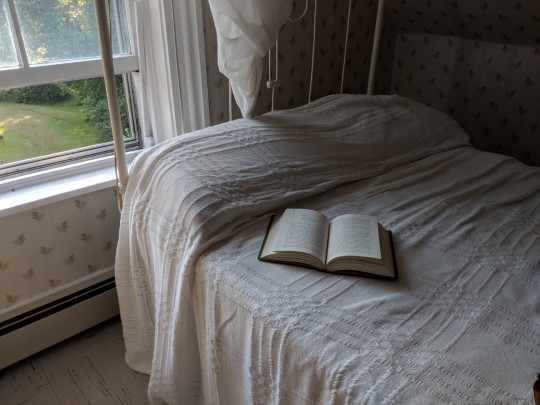
I have been thinking about an essay I read on Jezebel for the last while. It fit in so nicely with something I have been mulling over for months: readers. I mean serious readers. The kind of people that track their reading, that keep up with the publishing industry, that can relate to bookish memes, that overthink how their bookshelf is organized, and that seek out like-minded readers to interact with on social media. This essay, by Joanna Mang, uses a phrase for these kinds of readers: ‘Book People’. Mang uses it in a derogatory manner, and I have heard it used as such before though in those cases I believe the phrase Book Snob would have been more fitting. For Mang, Book People, are not the good sort of reader, but I want to unpack that in a bit.
Mang’s article is titled “We Have to Save Books from the Book People”. I actually only found it through a response written at Book Riot by Tika Viteri (“Back-Talking the Tone Police: Book People are Not Your Enemy”). Essentially, after rereading Mang’s essay a half dozen times (to try and follow the meandering argument and to seek what the point was) I think Mang is arguing a few things: that classics should still be taught in high school and not argued about on twitter, that English teachers bear no responsibility to encourage reading, and that Book People are bad for liking books a whole lot and have a Secret Plot to keep the publishing industry running. What any of this has to do with the title of her article remains unclear.
Mang opens her essay by complaining about people complaining on twitter. Specifically, people that are complaining about the classics they had to read in high school. The Great Gatsby, The Scarlet Letter, and Catcher in the Rye are all mentioned. Even more specifically Mang is upset at the redundancy of these arguments, that they come up again and again. I mean she is definitely correct, because once someone talks about something no one else is allowed to talk about that thing ever again. Ever. Right? I doubt it is the same person rehashing this conversation daily, more likely Mang has stumbled across or perhaps actively searched out these conversations as they are being had by different people. I mean as far as I know there are more than a handful of people using twitter, right? And if it is the same person dredging up this conversation daily, I have a suggestion: unfollow them. Problem solved. But then if that had happened, we would not have this essay to unpack.
Mang seems upset that people on twitter say that they felt forced into reading books that they did not enjoy. According to Mang anyone that disliked these books did so because these books are classics that they just failed to understand. Mang mentions that with a good lesson plan anyone can like classics, but perhaps they did not have a good teacher with a good lesson plan or maybe it is because they just did not connect with the book. Not everyone must like classics simply because they are part of the canon. A book’s inclusion within the canon does not mean that it is necessarily enjoyable to read or study for every single person. It simply means that it was influential in some way. I can recognize and value the significance of a classic novel and still also dislike the reading experience.
I did find it ironic that these conversations on twitter are doing exactly what Mang says she encourages her students to do: “When I teach literature, my goal is to give students the tools and confidence they need to attack and write about texts, to “talk to” the text rather than receive it passively” (Mang 2021). On these twitter threads we have people reflecting back on books that they were required to read in school. But because they are engaging with these texts on twitter it cannot count as the same thing? I have come across some fascinating analysis on classic books on social media that would have made my English professors proud. I fail to see the problem here.
Mang then goes on to speak about the notion of whether certain books should or shouldn’t be taught in school to avoid “turning kids off” reading, since this is often an extension of those twitter conversations. This is something that people in education have been honing for years. A quick google search reveals many theories, pedagogies and lesson plans that can help encourage reading. Teachers and other education experts are out there exploring options to encourage reading in their students. Why though? Why do we want turn children in to readers? Mang suggests that Book People have an odious plot to save the book-as-object which I will unpack in a moment. But maybe it is actually because it increases empathy? Or because it builds vocabulary? Because it prevents cognitive decline as we age? Because it is a stress reducer? Might even make you live longer? Improves general knowledge? Improves writing skills? Aids sleep? Could even help prevent alzheimers? I think it could be at least one of those reasons, especially since most of these studies explain that these benefits do not come from reading those three books back in high school but as a sustained habit over a lifetime. Though Mang, an educator, also states in her article “It’s not an English teacher’s job to make students love reading; an English teacher’s job is to equip students to read and communicate” (Mang 2021). Which I think is certainly true, but (thankfully) many other educators are attempting to go beyond the pressure to yield good test results and are still trying to help their students become readers. Of course, as Mang does mention, the formation of a sustained reading habit is based on more than a single factor (Mang mentions “parental attitudes, family wealth, the student’s disposition and other sources of stimulation”). Why this should excuse English teachers from even trying to encourage reading is lost on me. Further I also wonder what the point there is in teaching students how to actively engage with books if they are not continuing to read outside of school? Why bother with English class at all if this is the case?
I am not here to say that schools should not teach classic literature or should not encourage students to engage with the canon, I am here, however, to say that we can also all go on to complain about it on the internet afterward. If someone does not find value in these conversations, then they are free to tune them out.
After talking about education and American schools’ reading lists, Mang finally gets to the part about Book People. Mang differentiates between readers and Book People stating:
“A reader is someone who is in the habit of reading. A Book Person has turned reading into an identity. A Book Person participates in book culture. Book People refer to themselves as “bookworms” and post Bookstagrams of their “stacks.” They tend towards language like “I love this so hard” or “this gave me all the feels” and enjoy gentle memes about buying more books than they can read and the travesty of dog-eared pages. They build Christmas trees out of books. They write reviews on Goodreads and read book blogs and use the hashtag #amreading when they are reading. They have TBR (to be read) lists and admit to DNFing (did not finish). They watch BookTube and BookTok. They love a stuffed shelf but don’t reject audiobooks and e-readers; to a Book Person, reading is reading is reading” (Mang 2021).
Let’s dig into this before we get to the conspiracy. Just because I am baffled by the snobby tone of this paragraph, and I do not understand what is wrong with any of this.
A Book Person has turned reading into an identity: Just as many people do with any hobby, they tend to entrench themselves within it. People who hike seriously can and have turned that into an identity, they’re hikers. But just about everyone can walk so hikers should then not make their hobby part of their identity? Sometimes people really, really enjoy something and it becomes a big part of their daily life. What is wrong with that?
A Book Person participates in book culture: A culture can form around a social group. So, if we have a hobby group, which is a kind of social group, it is not hard to imagine that eventually a culture would build up around it. So then, yes, people would then also participate in that culture.
Book People refer to themselves as “bookworms”: What I am most puzzled by are the quotation marks, as if this nickname is something strange and new. The first known use of the phrase bookworm dates back to the 1590s and is defined as “a person unusually devoted to reading and study”. Yeah, it is a little dorky, but many hobbyists across various hobbies have silly names for the people of their hobby. Star Trek fans call themselves Trekkies or Trekkers and apparently train enthusiasts call themselves railfans. It’s a hobby thing.
and post Bookstagrams of their “stacks”: As for this, I think this is an example of a fascinating development among readers. Robert A. Stebbins, a scholar of leisure activity and hobbies, has long denied that reading could be considered a ‘serious’ hobby or what he refers to as a Serious Leisure Pursuit (SLP). He has maintained that reading is a prime example of a casual pastime, and even explores his stance in more depth in the book The Committed Reader: Reading for Utility, Pleasure and Fulfillment in the Twenty-First Century. He argues that reading cannot be a SLP due to the solitary nature of reading and the lack of a social world. To Stebbins a social world is a social network group made up of hobbyists and others connected to that hobby. Social media has changed that, however, allowing serious readers to form a social world and also find ways to make the act of reading more social itself. Book clubs have always been an attempt by readers to make reading more social. But social media allows these attempts to get closer to the mark. Readers on twitter host reading sprints to encourage people to read together at the same time. Others host read-a-longs on various platforms such as instagram to encourage a more engaging version of a book club that invites readers to read the same book section by section. And some booktubers (Book People on youtube), host live videos that invite their subscribers to grab a book and read with them. I will digress here for now, but this is something I plan on exploring more on this blog in the future. Put simply, what Mang is disparaging here is actually evidence of reading achieving SLP status under Stebbins’ hobby model. This is simply an active social world of readers.
They tend towards language like “I love this so hard” or “this gave me all the feels”: This is simply how people tend to talk on the internet? Especially amongst fandom communities, of which there is huge overlap in bookish communities. This is hardly exclusive to Book People.
and enjoy gentle memes about buying more books than they can read: memes are things people share on the internet. I am failing to see the issue with this. Again, not something exclusive to book people. What I am starting to see here is that Mang seems to take issue with internet culture in general, more so than with Book People.
and the travesty of dog-eared pages: Only Book Snobs care if other people dog-ear their own books. I am using the phrase Book Snob to distinguish between avid readers and people that find the book-as-object almost sacred. There can be overlap, certainly, but not all Book People see books this way.
They build Christmas trees out of books: No books were harmed in the making of those christmas trees. Oh, is this where the title comes in? Are we saving books from becoming christmas trees? I promise it doesn’t hurt the books.
They write reviews on Goodreads: I am confused by what is wrong with this. Mang stated earlier in her article that and I quote again, “when I teach literature, my goal is to give students the tools and confidence they need to attack and write about texts, to “talk to” the text rather than receive it passively.” How is reviewing a book not doing exactly that? Not all reviews are as aggressive as an essay can be perhaps, but it is still an act of engaging with a text rather than simply consuming it. Further, many Book People likely either have access to or want access to ARCs (advanced reader copies) from publishers and part of that deal is writing an honest review in exchange for the free copy of the book. So that would be them holding up their end of that deal. I am uncertain if Mang takes issue with goodreads in particular or with writing reviews in general.
and read book blogs: People that are active within a hobby often seek out other like-minded individuals. And beyond that most book bloggers are reviewers. Meaning people may be seeking reviews of a book to help them curate their reading selection.
and use the hashtag #amreading when they are reading: another example of Mang’s dislike of internet culture. People use hashtags to help get their media piece to others that may enjoy it or find commonality with it. They are using this form of metadata as it was intended.
They have TBR (to be read) lists: I think non-serious readers have TBR lists as well, but I think they tend to be more unconscious in nature. For example, a non-serious reader may vaguely know that there are some classics that they want to get to, or maybe the latest hyped general fiction novel. Book People are hobbyists, and if we used Stebbins’ model, they are serious hobbyists. They take their chosen leisure pursuit seriously and as such it is on their mind a lot because they intend to spend a significant amount of time pursuing that activity. So, it seems only natural that they may want to organize the content that they want to consume. It appears to me that Mang is more upset that this hobby group has formed in-group vocabularies. This means that only people residing within the group will understand some of the words or phrases used. This is a natural progression of language. You need words to succinctly capture the meaning of something. In this case, many readers have lists of books they want to read, rather than saying all of that it gets shortened down to TBR.
and admit to DNFing (did not finish): Are we saving books from not being fully read? Many of the books that Book People are reading are for enjoyment. If you are not enjoying something, why would you continue it? Do you watch the entirety of a season of a tv show that you are hating? No. Finish a snack that is making you want to vomit it back up? No. Same logic for books. To suggest you must complete a book simply because it is a book is more like Book Snob behaviour. This seems so common sense that I am again inclined to point to this as evidence of Mang’s distaste for in-group vocabularies more than the idea of not reading a book.
They watch BookTube and BookTok: This is further example of the community and social world that readers are setting up on the internet. People typically like making connections and further, making connections over something you share in common is natural. The internet made this easier, and social media has made it easier still. This is just evidence of readers seeking connections with other readers.
They love a stuffed shelf but don’t reject audiobooks and e-readers; to a Book Person, reading is reading is reading: This line is fascinating. Because following this, Mang’s article takes a turn toward a conspiracy about how Book People are trying to save the book-as-object since ereaders have threatened the physical book. And yet here, as part of her definition of Book People, she disparages Book People for finding value in ebooks and audiobooks. Mang herself becomes the Book Snob here, rejecting other book formats. Ebooks are convenient, you can have access to hundreds of books from your chosen device (I like to use my phone personally not an ereader). And audiobooks are great for when you are performing another task such as chores or driving. Both formats also allow people with disabilities better access to books. Audiobooks are perfect for people with visual impairments or who struggle to read. And with ebooks the size of the font can be changed to allow the book to be turned in to a large print book as needed and can even allow the font to be changed into a dyslexic-friendly font. To suggest that ebooks or audiobooks are not real books or don’t count as books is just blatantly ableist.
Let’s get to the conspiracy now. Mang claims that reading became an identity and a culture in response to the decline of interest in reading. She also continues on to say that not only is reading threatened by other media and diversions, but that ebooks and audiobooks distract from physical books. And so with the book-as-object threatened by television and alternate book formats, physical books became more precious. She even goes as far as to say books are fetishized. And then Mang says, “This could be why those arguing that classic books alienate young readers suggest 21st Century titles as substitutions: if we want to keep the book alive, we have to read, and more to the point buy, the books being produced now” (Mang 2021).
So let’s make this clear. According to Mang, Book People are people who have made reading an identity and revel in book culture. And Mang also already said that Book People “love a stuffed shelf but don’t reject audiobooks and e-readers; to a Book Person, reading is reading is reading”. But then Mang changes her argument and says that all of this is about the physical book. So, the people that complain about classics they read in high school on twitter, some of which are Book People, are all actually attacking classic literature because it may turn children off reading which would be bad because that would mean that less people are reading books regularly which is bad because then it means that less people are buying books which is bad because the book-as-object is precious and must be protected and perpetuated.
Riiiiight. I believe Mang conflated Book People with Book Snobs partway through this essay. They are not one in the same and by Mang’s own definition, Book People see any format of book as worthwhile. Meanwhile a Book Snob would uphold the physical book-as-object as the supreme format. So saying that Book People are behind this conspiracy simply does not hold up under scrutiny. Not that this conspiracy should carry much weight at any rate.
But then Mang wipes that argument away, saying that Book People are not that practical. That actually their purpose in complaining about classics books on twitter is solely to revolutionize American schools’ text selection policy. Further Mang seems to think that people ranting about their least favourite classic novel on social media is all about putting pressure on teachers and public education to shape their students into model human beings. When in reality, sometimes one simply needs to whine about a bad book, even if it’s a classic.
At the end of all of this, I am left simply confused about this essay. Firstly the title: “We Have to Save to Save Books from the Book People”. What books are we saving from Book People and how exactly do we go about doing it? Are we saving classics? Or are we saving the current school reading list books? Or physical books? Or ebooks? Perhaps it is that books are somehow being ruined by those that worship that book-as-object? I propose that Mang just thought it sounded good, especially seeing as how it does little to pertain to the wandering argument of this essay.
Secondly, I am also confused about what exactly is the point of this essay. The three main conclusions reached at the end of it seem to be that 1) arguing about classics on twitter does not impact text selection policy in schools, 2) teachers bear no responsibility in encouraging their students to make reading a habit, and 3) that books are not sacred objects. So what?
While I disagree with Mang’s essay, I do still find value in some of the points she brings up, and in her definition of Book People. I have been casually curious about the leisure studies, and where committed readers fit within leisure studies, for the last couple of years. Mang may not understand what she sees before her, but she did see something. It is that insight that has finally spurred me to dig into the social world of committed readers, or as Mang calls them, Book People.
#booklr#book blog#readers#bookworm#bookstagram#booktube#amreading#bookish#book people#paperback revolution
11 notes
·
View notes
Text
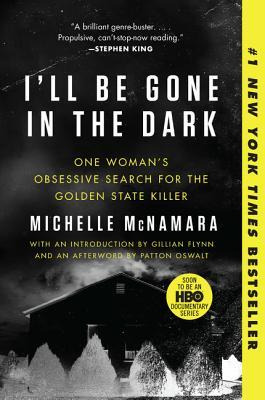
Genre: Nonfiction, True Crime
Rating: 4.5 out of 5 stars
Summary:
A masterful true crime account of the Golden State Killer—the elusive serial rapist turned murderer who terrorized California for over a decade—from Michelle McNamara, the gifted journalist who died tragically while investigating the case. "You’ll be silent forever, and I’ll be gone in the dark." For more than ten years, a mysterious and violent predator committed fifty sexual assaults in Northern California before moving south, where he perpetrated ten sadistic murders. Then he disappeared, eluding capture by multiple police forces and some of the best detectives in the area. Three decades later, Michelle McNamara, a true crime journalist who created the popular website TrueCrimeDiary.com, was determined to find the violent psychopath she called "the Golden State Killer." McNamara pored over police reports, interviewed victims, and embedded herself in the online communities that were as obsessed with the case as she was. At the time of the crimes, the Golden State Killer was between the ages of eighteen and thirty, Caucasian, and athletic—capable of vaulting tall fences. He always wore a mask. After choosing a victim—he favored suburban couples—he often entered their home when no one was there, studying family pictures, mastering the layout. He attacked while they slept, using a flashlight to awaken and blind them. Though they could not recognize him, his victims recalled his voice: a guttural whisper through clenched teeth, abrupt and threatening. I’ll Be Gone in the Dark—the masterpiece McNamara was writing at the time of her sudden death—offers an atmospheric snapshot of a moment in American history and a chilling account of a criminal mastermind and the wreckage he left behind. It is also a portrait of a woman’s obsession and her unflagging pursuit of the truth. Framed by an introduction by Gillian Flynn and an afterword by her husband, Patton Oswalt, the book was completed by McNamara's lead researcher and a close colleague. Utterly original and compelling, it is destined to become a true crime classic—and may at last unmask the Golden State Killer.
*Opinions*
As always with all nonfiction books, it is difficult for me to rate them due to the fact that I am not an expert on the material being presented. That being said, as I have become more and more interested in true crime, I’ve heard a number of podcast episodes about the Golden State Killer and gotten familiar with the general nightmare-inducing facts of the case. However, as most of those podcasts are either drawn from the same information or from Michelle McNamara’s work itself, it is impossible to tease it all apart. All that, on top of the fact that McNamara didn’t even get to finish the novel and therefore there are a number of different voices that are mingling with hers as well as unpolished text from McNamara herself, makes it impossibly to really be able to rate this novel in any critical sense. I feel torn because if McNamara had finished the novel it would be a 5-star read without even a thought and I don’t want to judge it harshly because of unfortunate circumstances, but this is far from a perfect book. While I enjoy true-crime podcasts, reading about true crime is a bit of hit or miss for me. If the author does not provide the information as a story but just a list of facts then I find it very boring. I am also finding that I am more connected, interested, and invested in a story when there is a focus on the victims and the people surrounding the crimes and not just whatever killer the book is about. There has been a conversation in a long time about how those covering crimes that they need to stop glorifying the killer as there have been criminals who state that they do these horrendous things just to get their names in the news and to live in infamy instead of focusing on the victims and their families. Yet as someone who has multiple mental health-related degrees, why serial killers become serial killers is interesting to me and most people want to find some common trait or thread to protect them from becoming a victim themselves McNamara walks the line between telling the victims stories without being voyeuristic to their trauma and speculating about who the Golden State Killer is without glorifying him. Never is he called a genius because that is the only way he could outsmart the police, but instead points out the lack of technology and the stubbornness to cooperate along with possibly a job that provided him skills and access to his victims that made it so the Golden State Killer hadn’t been caught at the time of writing the book. You care about the people who were terrorized and lost their lives because McNamara focuses on who they are as people, not because of the way they were attacked and killed. You can tell that McNamara wasn’t just obsessed with who the Golden State Killer is, but also cared about these people she had read about in police reports or spoke with find some closure. Reading this knowing that McNamara passed away not only before her book was published, but also before the Golden State Killer was caught gave an air of sadness to this novel. I know this was probably just my knowledge of the event surrounding the novel and events, but I almost felt that McNamara was slightly sad as well when compiling all these cases and all the destruction that had been left in one individual’s wake. She was also aware that she was missing parts of her personal life due to this obsession, which makes it all the sadder knowing how little time she had left while talking about forgetting anniversaries and hating movie premieres. That being said, the overall mood is frustration and determination that someone, somewhere would get this guy and she was right. When I read the notes compiled by others who finished the book I felt a little well when some of her notes were going down the ancestry DNA route, knowing that ultimately that is what helped them find him. I know that the individuals who wrote the last sections of the novel, Billy Jensen and Paul Haynes knew that they couldn’t write like McNamara, they said so themselves, still that last section was so disjointed that I found myself losing a lot of interest in the last 40 pages. That’s possible because I knew how the story ended, even though they didn’t while compiling the last part of McNamara’s research so it was just sad seeing all these things that she never got to finish than wondering if one of these pieces of information would have lead to catching a killer. Overall, this is a compelling and chilling story about one man making an entire state fear the dark for a decade. McNamara’s writing is real and emotional and likes having a conversation with a friend of coffee as she tells you about this thing she’s obsessed with. While I did not find the end of the book interesting, I think it is a 4.5 star read, which I will round up to five. It’s sad to think how many other people McNamara could have researched in an attempt to bring them into the light if she hadn’t passed away.
2 notes
·
View notes
Text
Ouija, Origin of Evil and the profane voice - Part I
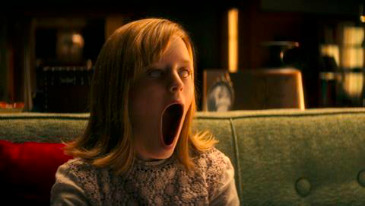
Though extremely shocking and disturbing, children happen to be at the core of major horror films. Samara in The Ring (2002), Dalton in Insidious (2010), Dany and the Grady twins in The Shining (1980), the children in Sinister (2012), Thomas in The Orphanage (2007) are among many other examples that prove the existence of an entire branch of horror cinema built on the mythology of the malevolent child. Why is the figure of the child so prevalent? Why should the most innocent and purest human beings be the main characters of films that are gruesome, violent and whose public age is strictly restricted? Precisely because their vulnerability and purity of soul make them easily influenced and manipulated by external forces. Besides, children are known to have an overwhelming imagination and a propensity to trust which are necessary to open the boundaries between the worlds of the living and the dead in accordance with the codes of the genre.
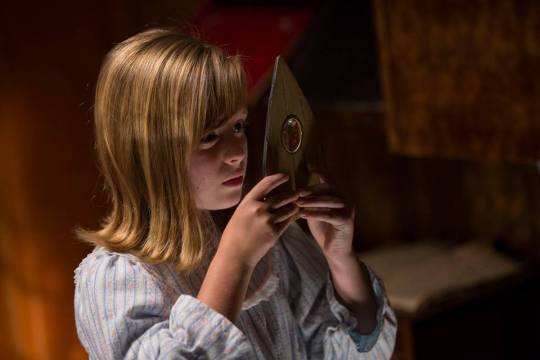
In addition to this, the more the prey is opposite to our expectations and subverts our beliefs of what is proper and what is not, the more the fright and fascination are potent. To consider a child as a monster, a killer or a possessed body is beyond our general understanding, hence the uncanny appeal of creepy children.
As pointed out by Alison Nastasi in her article published online on Hopes&Fears, this devious appeal for corrupted and murderous children portrayed in horror films might echo to « real-world fears about parenting, gender and social responsibility. »; a theory supported by Joe Dante’s comments about the subject : « Could it be connected to the fact that more and more parents have difficulty balancing work responsibilities [and] child-rearing (not to speak of nurturing their own relationships, personal and career aspirations) and are squeezed financially by the costs of raising children […]? Therefore, is it any wonder that children in genre movies are portrayed as powerful, disruptive, and uncontrollable? Perhaps these menacing moppet movies reflect the fears inherent in helicopter parenting—that the minute you take your eyes off your child, something dreadful will happen. » In any case, the films in question use the creepy kid trope in order to suggest that something is wrong, that the natural order of things is being shattered.
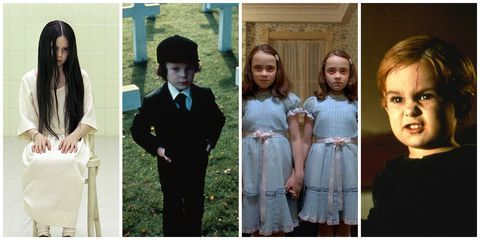
The corruption of innocence can take many forms but the most interesting one to study in relation to the narrative role of the voice in cinema is the threat of an invasion from the Beyond. In Ouija: Origin of Evil (2016), supernatural forces hold a young girl hostage by inhabiting her body and making it go through such transformations (vocal and physical) as to change it beyond recognition.
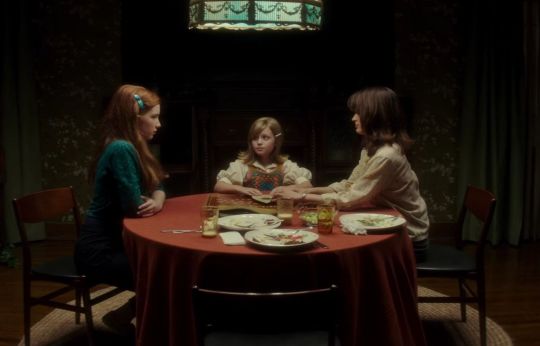
Taking place in 1967 in Los Angeles, Ouija: Origin of Evil tells the story of the Danzer family. Alice, a spiritual medium, is striving to make ends meet after the loss of her husband and father of her two children by hosting readings in her own house with the help of her daughters, Lina (15) and Doris (9). Running a declining scam business, in which Alice pretends to talk to the dead to bring closure to people and the girls help her out with tricks intended to make it all real, Lina suggests her mother to add a ouija board as a new prop to modernise her readings. The factitious dimension of the ritual which unfolds through the display of ingenious devices (stretchable table, a cupboard big enough to hide Doris, extinguishable candles…) is both an ironical comment on how fake spiritism is going to beat the family at their own game by revealing its true power and also a cleverly designed introduction to set the tone and build the tension.
All the ingredients are here to turn the ouija experience into a nightmare. The bereaved family is craving for a contact whatsoever with their loved one, little Doris first. She wishes she could talk to her father at a seance like other people do when they come and see her mother for help, that is why she does not talk to god directly but instead send prayers to her dad every night before going to bed. Contrary to Lina who is a teenager in complete denial and pushes down her feelings, Alice and Doris seek communication and are open to it, hence the evil befalling on them.
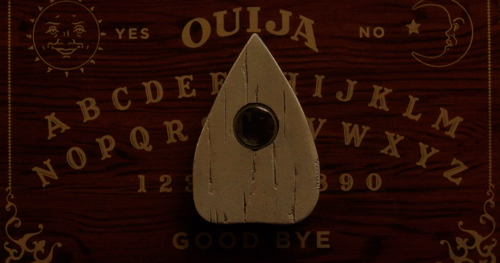
Portrayed as an angelic but lonely and bullied girl who is deeply grieving her father and believes in the blurry frontiers between the worlds of the living and the dead, Doris becomes the perfect human and tangible vessel through which supernatural forces can express themselves. All starts with the introduction of the ouija board as a prop into the house and with Alice breaking the three rules which are to never play alone, in a graveyard and never forget to say goodbye. At this very moment, Doris becomes inhabited by Marcus’s spirit whose identity is yet to be defined. How does this possession first transpire? Through speaking. Marcus uses Doris’s voice to start materializing and, as soon as she touches the board, the voices appear all around her, thus enabling the world of the Beyond to let in.
Doris is progressively attracted by the ouija board which makes her believe she is talking to her father, Roger. They are deceitful spirits who do everything to earn her trust to better trap her, hence the hint at the money buried in the cellar. Contrary to Lina who is far from being fooled, Alice thinks her youngest child is gifted and asks her for help. As the readings follow one another, the trap is closing in around Doris who starts feeling pain in her neck at the same time she excels in the occult. She can now reproduce the voice of the deceased summoned during the seance.
Once she is fully possessed, Doris first goes through a radical physical and behavior transformation by becoming lethargic, stolid, her eyes often turned white when no one is watching her. Besides, her vocal abilities also go through creepy changes. In addition to mimic the deceased’s voice during the readings, adults’ voices, Doris keeps whispering in people’s ears in a demonic way when the evil entity starts spreading its malevolent influence on the whole family.
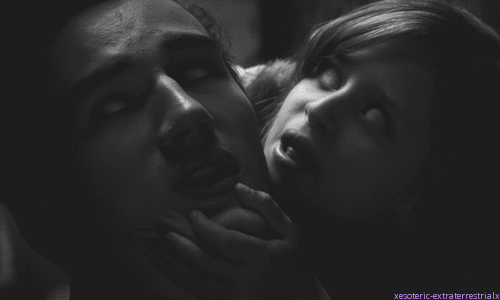
When the film reaches its climax and Doris fully assumes the devil’s voice, which is guttural, otherworldly and distorted by hatred, she no longer is a young innocent child. Marcus’s spirit corrupts and perverts Doris to achieve revenge by desecrating her body and soul and making her utter bloodcurdling things. The scene which most epitomizes the figure of the violated child is when Doris explains step by step to Lina’s boyfriend how it feels like to be strangled to death. The most uncomfortable thing about it is to witness the contrast between what she says and the sweet voice in which she says it with an angelic smile on her face. The mise-en-scène that keeps stressing Doris’s vocal changes, by shooting her facing the camera (or the fourth wall) as if she was already part of the Beyond, is meant to emphasize the element through which she is channelling these powers and forces : the mouth.
youtube
The mouth as an organic element stands as a kind of leitmotiv throughout the film inasmuch as the possession of Doris’s body and soul by the demonic entity is made complete through that means. One night, Doris is awakened by her pain in the neck and gets assaulted by a dark creature who thrusts his devilish arm into her throat. This shadowy creature, one can notice, has no mouth or rather a distorted sewed one, similar to Lina’s mouth when she looks at herself in the mirror one night. At the light of these elements, what was supposed to be a nightmare was in fact real and prophetic.
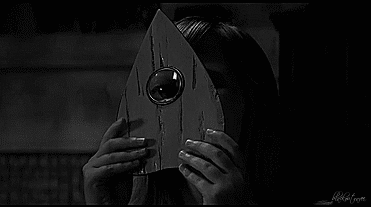
But what can be the meaning of the recurring imagery of the sealed mouth (see also Lina’s doll)? Who is Marcus? Why is he portrayed as an evil spirit? What does he want from Doris and her family? He clearly states his purpose when trying to possess Lina’s soul : to snatch her voice.
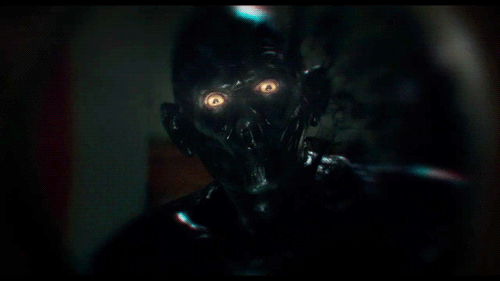
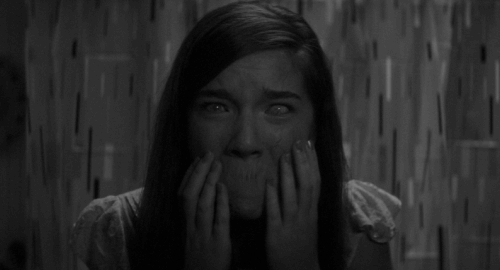
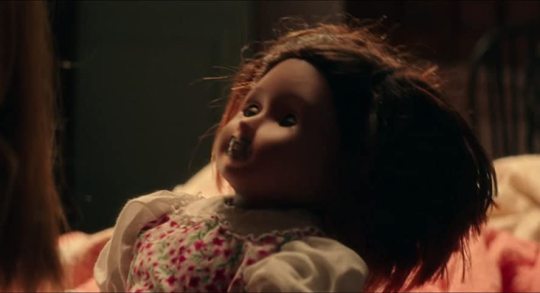
Father Tom Hogan, a friend of the family, is the one who uncovers the ugly truth behind Doris’s pretended benevolent gift of clairvoyance. She is not channelling good forces but Marcus’s spirit, a man who happened to have been mutilated and murdered in this house a few decades ago. After the second world war, a twisted nazi doctor, called the devil’s doctor in the camps, escaped to America where he succeeded to get hired in a mental institution. He went on practicing his sadistic experiments on patients in the basement of his house. In order to do it, he cut out their tongues, severed their vocal cords and sewed their mouths so that no one could hear them from above. However, Marcus’s story does not end with his death. Violently murdered, he never rested in peace but instead was doomed to wander in the cold darkness of the underworld among other desperate, voiceless souls and malevolent creatures who must have been summoned by the doctor who was into the occult.
In the end, Marcus, who has been silenced by force, deprived of his own voice and overtaken by the surrounding evil influence in the Beyond, seeks revenge against god and people who have the ability to express themselves, eaten away as he is by hatred, frustration and pain. The only way for him to exorcise the horrible things he has been through is to communicate and hurt others, but for that a voice and a body are needed, hence his attempts to snatch the family’s voices. That is the only way to be heard and to have an influence outside his doomed world. Helped by her father’s good spirit, Lina grabs needle and thread and silences her sister for ever, thus fighting hard against the entity who strives to engulf her.
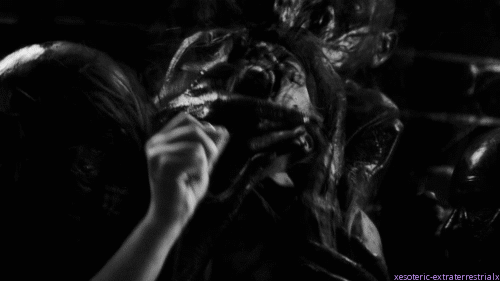
Ouija, Origin of Evil, like many other horror films, uses the voice and its communicative powers as narrative tools to address issues and challenge notions such as grief, loss, family unity, parenting, revenge, alternative beliefs, suffering, innocence, corruption, violation and religion. Religion…such a crucial theme whose set of practices and beliefs makes it the most cherished subject of the genre. Any idea which emblematic film is yet to be analyzed in the perspective of the profane voice and corruption of innocence?
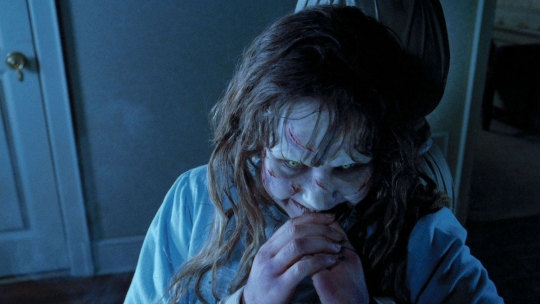
#ouija#ouija origin of evil#horror film#ouija board#mike flanagan#elizabeth Reaser#annalise basso#lulu wilson#henry thomas#devil#spiritism#occult#voice#profanation#lina#doris#mouth#creepy children#cinema#supernatural#whispers#religion#film analysis#child#innocence#revenge#grief#loss#soul#voiceless
23 notes
·
View notes
Text
Blessings, Curses, Autism
My earliest memories are of waiting rooms with musty carpets and buckets of donated, broken toys. I guess it was worse for my parents, who had nothing to stare at but walls and trashy lifestyle magazines. Eventually, the professionals decided I had a condition called Asperger’s Syndrome, and there was one thing they wanted me to understand:
“It’s a blessing, not a curse.”
If someone asked me to list blessings off the top of my head, I’d mention 20/20 vision, pitch-perfect hearing, or George Foreman’s chin — not a neurological disorder that transforms the most natural stages of personal development into a confusing struggle. In hindsight, I would have preferred more concrete advice than ‘it’s a blessing, not a curse.’ Something like:
“Watch out for the train!”
…But the quippy slogan is what stuck. My parents dispensed it like a cheap plaster, and I still don’t know whose benefit it was for — mine, or theirs. What I do know, is that I never once believed them: I felt I was being brushed aside, or told to accept something blatantly untrue. Besides, children don’t care to question whether they’re blessed or cursed, so it was an answer to a question that hadn’t been asked. Existentialism is for adults trying to make the best of a bad situation.
Being an Autistic Child.
Autism is not a superpower. Thanks to certain pieces of popular media, you might think of autistic people as quirky-yet-brilliant detectives, awkward-yet-sexy hackers (always female), or nonverbal children with a deep, instinctive connection to whatever animal or alien the protagonists are trying to communicate with. Often, people with severe autism are plot devices in the same vein as a forbidden orb or set of nuclear launch codes. Instead of damsels waiting for Bruce Willis to save them, they’re objects waiting for Bruce Willis to understand them.
A lot of autistic people are brilliant academically, though not for the reasons you might think. A common feature of autism is hyper-fixating on ‘special interests’, obsessing over a subject until one has learned everything about it, before moving on to the next. Very few people become maths geniuses this way; more often they become diehard Sonic fans or start giving lots of money to Games Workshop. Here are a few of the phases I went through:
- Thomas the Tank Engine.
- Pokémon.
- Old English monster myths.
- Naruto.
- Peter Jackson’s King Kong (both the movie and the video game).
- Bleach (the anime, thankfully, not the cleaning product).
Fairly normal interests for a young person, right? Now remember the hyper-fixation part. People with Asperger’s tend to focus on certain interests at the expense of others, and those ‘rejected interests’ are usually vital for social development. Now remember that high school is a psychopathic hellscape crawling with cruel little monsters ready to vent their newfound territorial instincts on anyone who doesn’t fit in. The kid who wants to discuss the depiction of brontosauruses in a sort-of-okay remake of a 1933 movie isn’t doing himself any favours — constant bullying drives him even deeper into reclusive interests and solitary hobbies, and from there, it’s the luck of the draw whether those hobbies resonate with any of the kids around him.
I’ve always known a lot about things no one knows about, and nothing about things everyone knows about. This, along with the fact that a lack of social life makes it easy to focus on one’s studies, creates the illusion that some autistic kids are eccentric geniuses-in-the-making. Parents — especially the parents of autistic children — are quick to latch onto any display of intelligence. They watch intently for any sign their long struggle is paying off, and when it happens, they praise their child endlessly, reinforcing behaviour patterns both good and bad. Because adults told me I was intelligent, I told other children I was intelligent, and you can imagine how well that went.
This misapprehension — confusing a bunch of random trivia for genius — followed me into high school, hurting me all the while, which is ironic, because it was the only positive way I could think about myself.
I’m lucky to have found books and writing as lifelong passions, but that almost didn’t happen; in fact, I used to despise any writing task the teacher set for me, to the point of outright refusing to do the work. In my defence, I was trying very hard to be somewhere else at the time — mentally, that is. The idea of putting my feelings on paper, for all to see? I couldn’t conceive of anything more terrifying.
Harry Potter changed things. I was gifted The Deathly Hallows when it was first published, and even though I had no idea what was going on in the story (I hadn’t even seen The Order of the Phoenix yet), I thought it was wonderful — maybe because I was getting a sneak peek into a future movie. Since then, I’ve always had a book close at hand, and it wasn’t long before I started writing my own novels (more on those another time).
Voracious reading was, technically, another un-social activity that would consume my waking hours, but at least it was productive. My grades improved dramatically. I got good at writing essays. I became better at expressing myself, and I started to consider other people’s points of view. I made friends, lifelong bonds. I wouldn’t say I was happy at that stage of life — bullies tend to push back against things like improved mental health — but at least I was growing.
Looking back, I can’t help but wonder how close I came to disaster. I was 13 or so. If I’d left it any later, I doubt the outcome would have been so peachy. There are plenty of autistic adults with no friends, no employable skills, no human contact but ageing parents and rare, fleeting therapy sessions. Many of these people are quirky and brilliant, but there’s no happy ending for them.
Being an Autistic Adult.
Autism never goes away. It never gets ‘better’. It isn’t curable because it’s not a disease, despite what the vaccine deniers might tell you; autism is an intrinsic part of my neurological makeup, and living with it is a process of compromises.
I had to accept, early on, that I’m not the same sort of human being as the people around me. My brain is a different brand of brain: it makes different connections, processes different bits of data at different speeds. Things that seem obvious to you, need to be explained to me. I struggle to read a room, and I’m never quite sure if the person I’m talking to would really rather I shut up.
Put simply, my childhood experiences made me keenly aware of myself as an outsider. I need to watch for people’s reactions to anything I say or do, all the while navigating a maze of social cues and left-unsaids — but sooner or later, I’m always going to slip up. When you are differently-brained, it’s easy to misinterpret instructions, or to misjudge which thread of discussion is most important; and when you’re processing so much data at any one time, small-yet-vital points are going to slip under the radar. The result is being told off, being laughed at (‘laughing with you, not at you’ is another fun slogan I’ve learned to endure), and generally feeling stupid or useless for overlooking one point of data among hundreds.
As I grew into an adult, I got better at performing normal. Nowadays, only those who spend a lot of time around me can spot the signs of my condition: I seem confident, funny, sympathetic, and I make friends easily. As I write this, I can’t help but feel uneasy: it makes me wonder, and not for the first time, how much of my personality is genuine. In high-stress situations, the generic piece of advice is ‘relax and be yourself.’ Succeeding in life as an autistic person means learning not to be yourself, or at least creating a version of yourself that can exist in public — so, where does the real me end, and the performance begin? Are they one and the same? I’ll never know the answer to that question.
Being an autistic adult, then, means pretending I’m not autistic for the benefit of other people. It’s a lifelong, often exhausting performance, and the temptation to retreat into my shell is ever present. But, just like anyone else, I long for human contact, so the compromise is a necessary one.
Blessings & Curses: Redux.
Terry Pratchett wrote that humans need to learn to believe the little lies so they can believe in big ones. There’s something I wish I knew during the bad years; that I was far from the only person suffering from my condition. My parents were stumbling in the dark just like me, except they had to pretend everything was under control.
My dad confided in me, recently, how he used to cry — a lot — during those days when I would return from school after another worst day of my life, talking about footballs thrown at my head, being cornered and verbally abused, or being removed from class after another tantrum. These were practically daily occurrences, and they’ve left their lifelong marks on me, but I’ve never lacked for brilliant people willing to help, people who were alongside me in my suffering. Raising a child is hard, and raising a neurodivergent child is even harder. Can I blame my parents for wanting to believe in blessings, and not curses?
Most of the time, those bad years seem like a distant memory. I don’t see autism as my blessing or my curse; it’s just a part of me — a frustrating, limiting, often embarrassing part of me, but one just as vital as my eye colour or ethnicity. I’ve come to accept it and be content despite it, and I suppose that’s the best outcome I could hope for.
5 notes
·
View notes
Text
NEW FACE OF LANNY IN VIENNA
ACT I SCENE I
Italy, Rome, the Vatican reception hall. VOIELLO and SOFIA are waiting at the popes desk. The YOUNG POPE enters the stage with a plain plate in his hands.
„This is the sort of merchandise im prepared to authorise.“ He says.
„But it doesn’t have your image on it!“ Sofia answers.
„I do not have an image, my good lady, because I am no one. You understand? No one. Only Christ exists. Only Christ. And I am not worth forty-five, or even five euros. I am worth nothing.“
„I don’t understand, Holy Father.“
„Of Course you don’t, because, as you said earlier, you studied at Harvard. And Harvard is a place in decline where you were taught to lower yourselves. Where as here, in the Vatican, we try to elevate ourselves. Who exactly is in charge of curating the image of the pope?“
„The Secretary of State entrusted that delicate task to me, Holy Father, two years ago.“
„Very good. And now I’m going to tell you what you as curator of the image of the Holy Father, are gonna do. You are gonna fire the Vatican’s official photographer immediately. No photographs of the pope are to be issued. Just as there were none when I was a cardinal or a bishop. Do you know why? I never allowed my picture to be taken. And when someone managed to sneak a photograph of me I always bought them up before they could be published. Now that I think about it. I’ve been training my whole life to be an invisible pope.
And so, for my first adress, you will see to it that the lightning is so dim, no photographer, no TV cameraman, and not even the faithful will see anything of me but a dark shadow, my silhouette. They will not see me because I do not exist.“
„If I may, Holy Father, what you are proposing is nothing short of suicide, media suicide.“
„Media suicide, you say? Fine. Now try to keep up with me, if you can.“
„I’m right with you, Holy Father.“
„Good. OK, so, who is the most important author of the last twenty years? Careful now, not the best, virtuosity is for the arrogant, the most important, the author who has sparked so much morbid curiosity that he became the most important.“
„I wouldn’t know. I’d say… Philip Roth?“
„No. Salinger. The most important film director?“
„Spielberg.“
„No. Kubrick. Contemporary artist?“
„Jeff Koons. Or Marina Abramovic.“
„Banksy. Electronic music group?“
„I don’t know the first thing about electronic music.”
“You say Harvard is a good university! Anyway, Daft Punk!”
„The best Italian Vocalist?“ Voiello interrupts.
„Mina?“ I answer.
„Brava! Now do you know what it is what the invisible red thread is that connects them all, all these most important figures in their respective fields? None of them let themselves be seen. None of them let themselves be photographed.“ The pope answers.
„But you’re not an artist, Holy Father. You are a head of state.“
„Yes, of a city state so small that it doesn’t have an outlet to the sea. And in order to survive it’s leader has to make himself as unreachable as a rock star. The Vatican survives thanks to the hyperbole. So we, we shall generate hyperbole but this time in reverse.“
„I’m beginning to get your point, Holy father. Yes, not only am I beginning to get it. I’m beginning to like it, too.“
„Good. Very good.“ [1]
ACT I SCENE II
The Off. It’s dark. Only the NARRATORS voice can be heard.
The pope [...] was possessed by a veritable rage for acquiring and storing up knowledge.[2] Wanting to know is an offspring of the desire for power, the striving for expansion, existence, sexuality, pleasure, enjoyment of the self, and for anesthetizing the necessity of dying.[3] He is large minded, not through knowledge, but through the power of acquiring it; he is open minded, intelligent, ready for anything, and, as Montaigne says, capable of learning if not learned. [4] As knowledge and will are attributed to God, so is power. Further, as the power of God is infinite, so is His knowledge.[5] The young pope is searching for a way to acquire as much knowledge as possible. He thinks about buying Alphabet. In the end, more than in God it is necessary to believe in yourself, Lenny.
God does not shout.
God does not whisper.
God does not write.
God does not hear.
God does not chat.
God's infinite silence...[5]
What if god shouted, whispered, wrote, heard, chatted and broke his silence? What if god had Instagram.
ACT II SCENE I
Austria, Vienna, 3rd district at Parkgasse 18. The WITTGENSTEIN HOUSE enters the stage, surrounded by its garden and neighbourhood.
The house is thinking: How can I help Lanny to reach the eartheners? I need to understand them. But as I cannot move they have to come to me. I need to offer them something they desire so they can not resist. They are the bees and I’m the honey.
I remember a story an old friend once told me: “There was once a young man who dreamed of reducing the world to pure logic. Because he was a very clever young man, he actually managed to do it. When he’d finished his work, he stood back and admired it. It was beautiful. a world purged of imperfection and indeterminacy, countless acres of gleaming ice stretch into the horizon. So the clever young man looked around the world he’d created and decided to explore it. He took one step forward and fell flat on his back. you see, he’d forgotten about friction. The ice was smooth and level and stainless. But you couldn’t walk there. So the clever young man sat down and wept bitter tears. But as he grew into a wise old man, he came to understand that roughness and ambiguity aren’t imperfections, they’re what make the world turn. He wanted to run and dance. And the words and things scattered upon the ground were all battered and tarnished and ambiguous. The wise old man saw that that was the way things were. But something in him was still homesick for the ice, where everything was radiant and absolute and relentless. Though he had come to like the idea of the rough ground, he couldn’t bring himself to live there. So now he was marooned between earth and ice, at home in neighter.” [6]
I am a contradiction. [7]
A nightclub and a spa,
sin and salvation,
extasy, excess, gambling and baptism,
doubt and hope,
mystery and logic,
ornamented and functional,
hell and heaven,
baroque and modern,
I am dionysos and apollon.
ACT II SCENE II
Austria, Vienna, 1st district. AVA sitting at a desk.
The phone rings. [8] She opens the message.. „My dearest friends there’s one spectacular party in the making! Join us tonight in the Wittgenstein House to another legendary night. Make sure to wear your most luxurious textiles and we take care of your deepest desires.“
ACT II SCENE III
Austria, Vienna, 3rd district at Parkgasse 18. It’s night but the garden is enlightened by the colourful lights emerging the windows. The WITTGENSTEIN HOUSE is emitting visual, audible and perceptible vibrations. The air smells of Un Jardin en Méditerranée. A car enters stage right. Inside are AVA, LUX, EMMA and NOVA.
We arrive at the Wittgenstein House. It’s one o’clock, time for some ecstasy. I divide the crystals into four parts and hand them to the others. I take the last one and we step out of our taxi. Instantly we are surrounded by an electric atmosphere. People get chauffeured around in Mercedes Benz with Cristal champagne.[9] On inspecting the entrance facade, you can discover a series of metaphors and symbolic signs.[10] The bass seems to shake the walls. Bright lights in countless colours emerge through the windows. Life is fantastic. It would be too strong to call this fantasy a portal to Hell, but it is surely no entrance to a Heavenly Jerusalem.
The party begins as people are moving in, gathering in the entrance hall and taking a stand up cocktail.[11] There is champagne, caviar and fireworks.[12] Ahead, some distance from the entrance, is a great mural of brilliant color.[13] Opulent Ornaments, heavy textiles, reflecting surfaces. The materials come from the everyday domestic sphere, much having to do with ornamenting the body: copper and brass wire, buttons, beads, baubles, hooks, eyes, straps, false fingernails, makeup, hair, ribbons, lace, thread, shells, feathers, and bones. The amulets are fetishes, beautiful ornamental objects, and they are connected to the fetishism of architectural representation.[14]
following... experience of other chambers:
sauna is heat, sweat, cleansing, liberation, relief
spa is warm, soft, welcoming, salvation
etc.
[1] The Young Pope
[2] Hugo, Notre Dame de Paris
[3] Sloterdijk, Critique of Cynical Reason
[4] Rousseau, Collected Works of Jean-Jacques Rousseau
[5] Aquinas, Summa Theologica
[6] The Young Pope
[7] The Young Pope
[8] Cixous, Reveries of the Wild Woman
[9] Hovestadt Buehlmann, Quantum City
[10] Hays, Architecture Theory since 1968
[11] Schumacher, The Autopoiesis of Architecture Vol 2
[12] Carter, Anthony Blunt His Lives
[13] Ockmann, Architecture Culture 1943 1968
[14 ]Hays, Architecture Theory since 1968
2 notes
·
View notes
Text
RECENT NEWS, RESOURCES & STUDIES, May 2, 2021

Welcome to my latest summary of recent ecommerce news, resources & studies including search, analytics, content marketing, social media & Etsy. If you are interested in Etsy news, please read my top story below, as there seem to be a lot of changes afoot. (There is also a section general Etsy news below that.)
If you have any questions or news you would like me to cover, please drop me a line here on Tumblr, reply to this post, email me, or contact me on Twitter.
TOP NEWS & ARTICLES
Something is brewing at Etsy: as of April 26, people in almost all non-Etsy Payments countries “temporarily” cannot open new shops. They hid this development in a Help file, but someone reported it to Ecommerce Bytes, which garnered more attention. Why does this matter? Currently, Etsy Payments (EP) is only available in 44 countries; i.e., most of the world cannot currently open a new shop on Etsy. [Updated May 3 2021] Apparently the only exception is India; see the screenshot below, which someone kindly sent me:

(please click to see it in more detail, or check it out on Twitter)
There was no warning, and no published end date, even though they say it is temporary. Of course, they say it is to protect buyers, but they said that when they removed standalone PayPal too, and we know that was just about making more money. It’s possible they are adding new payment companies to the backend which will be able to operate in most of these countries, greatly expanding their take from EP. The first quarter report is scheduled for May 5, and that is often the time they announce new or expanded income streams. Expect to learn more sometime around then. In the meantime, watch for payment glitches.
It is also possible that the above situation is related to the glut of bad press Etsy has garnered recently. They released a blog post on April 29th, explaining how they plan on spending $40 million extra this year on marketplace enforcement. Turns out, they were just trying to get out in front of an April 30th report from Business Insider [paywall], which describes 800 policy violations in listings on the site. You can get the details in articles from Engadget and Gizmodo. This might get more traction, as both Insider and Gizmodo noted it is very easy to find more prohibited and even illegal items on Etsy.
“After Etsy deleted the listings the outlet identified, Insider reports that it was still able to find several others for ivory products, brass knuckles, mandrake roots, tools for using cannabis concentrates, mass-produced products, and other banned items. We poked around Etsy’s marketplace as well, and within a few minutes found a bunch of prohibited products, including a vintage ivory bracelet put up for sale as recently as March, several weapons that are plainly marketed as such, and a shop with more than 1,000 reviews selling all manner of spells for attracting love, wealth, and what have you.” [from Gizmodo]
Note that Etsy has also changed the wording of its Prohibited Items policy to include new definitions for counterfeit items. See discussion on this Reddit thread. Etsy is also still getting negative attention for allowing fake COVID-19 vaccine cards to be posted for sale. Vice has the most recent article, and Forbes has an overview of this hot new scam area.
So, is all of this linked, and if yes, what does it mean? Etsy hasn't cared about enforcing its listing policies for many years, as long as the media doesn't notice. Heck, you can still buy gift boxes of manufactured candy in thousands of shops, which is expressly prohibited, yet reporting never removes them. Is the media finally noticing enough to make a difference, or is Etsy really embarking on a huge cleanup that includes (at least temporarily) banning people from most countries from opening new shops? We will likely learn more this month, and perhaps even this week.
ETSY NEWS
Etsy says that shoppers are searching for “eco-friendly” items more often this year, and released a trend report on the topic. Insights include “42% YoY increase in searches on Etsy for reusable cotton menstrual pads...100% YoY increase in searches on Etsy for reusable straws...76% YoY increase in searches on Etsy for food covers...54% YoY increase in searches on Etsy for reclaimed wood shelves...176% YoY increase in searches on Etsy for environmentally friendly candles...712% YoY increase in searches on Etsy for eco-friendly tissue paper...285% YoY increase in searches on Etsy for vintage hoodies.” Definitely read the report if you want to know everything that people are looking for.
They also did a UK-based article on trends in outdoor items. Search tips of note: “2,644% YoY increase in UK searches on Etsy for patio furniture...Over 1,000% YoY increase in UK searches on Etsy for spring wreaths...1,266% YoY increase in UK searches on Etsy for garden lights or lanterns” It is hard to say how much these trends can be extrapolated to other countries, as the UK appears to have embraced online shopping much more during the pandemic than some other countries (see story below).
The latest Etsy Success podcast [transcript with podcast links] covers their buyer research, as well as a few questions from sellers. Not much here, except for the fact that they do expect wedding sales to pick up.
Reverb had a really large data breach, exposing the personal information of over 5 million customers.
As mentioned above, Etsy’s first quarter financial results for 2021 will be out on May 5th.
Apparently, Etsy is testing videos in search; here is a forum thread on the topic.
SEO: GOOGLE & OTHER SEARCH ENGINES
Here is an intermediate/semi-advanced article on ecommerce websites and common SEO issues. If you don’t do any of your own coding and don’t have much control over site design and indexing, skip the first 3 points.
Link building: what is a high-quality link? (you know, the type we are always told we need.) Moz’s Whiteboard Friday covers the basics. [video & transcript]
If you are new to blogging or writing instructional articles for your website, this template for writing for both readers and for Google SEO should be very useful.
Google introduced an algorithm update for product reviews starting April 8th. If you review other products on your website or blog, you will want to get the details here and here.
The Google page experience algorithm update has been delayed; it is now going to start in June and be completed by the end of August. That and more is covered in the Google Search News video for April. [YouTube video with highlights and links in the comments]
Yes, you can use SEO to get more attention to your podcasts. Here’s a detailed how-to.
Focussing on YouTube? Here are some tools for YouTube SEO. (Some are free or have free versions.)
There are probably as many Google SEO myths as there are Google algorithm factors, but Google saying something isn’t true isn’t always proof it is a myth. With that in mind, please enjoy this summary of 15 Google ranking factor myths (some of which are in dispute).
[semi-advanced content] The current state of long tail SEO has changed due to both searcher behaviour and Google, and that has led to both more and less opportunity. [Google redirecting results to what it thinks the searcher really wanted, even when the exact words aren’t on the page that they rank first, reminds me of what is happening with Etsy search lately.]
(CONTENT) MARKETING & SOCIAL MEDIA (includes blogging & emails)
Facebook still has the most traffic in the US, compared to all other social networks, but YouTube is even more popular. YouTube and Reddit are the only established major platforms with significant growth since 2019. You can read more details from the actual study here.
Instagram is working on new ways for creators to make money on the platform, not just those with business accounts.
HubSpot put together a summary of how the algorithms work on Facebook, Twitter, And Instagram.
Reddit appears to be testing a group voice chat feature, which would compete with Clubhouse.
TikTok isn’t just for young people; parents and grandparents are now on the platform too.
Twitter’s timeline algorithm (active if you are seeing “Top Tweets” on your feed) tends to ignore a lot of external links, and more than half of the posts can be “suggestions” from people you don’t follow. I’ve noticed lately that Twitter rarely makes suggestions in my chronological timeline anymore, except when I don’t have any activity for over 24 hours.
Twitter obeyed an order from the government of India and removed several dozen tweets which criticized the government’s COVID-19 response. The tweets in question can still be seen outside of India, however.
ONLINE ADVERTISING (SEARCH ENGINES, SOCIAL MEDIA, & OTHERS)
Understanding the definition of “return on ad spend” (ROAS) is the first step to making sure your ROAS is good for your business. “in general, a ROAS of 4:1 ($4 in revenue for every $1 spent) or higher usually suggests a successful campaign. But keep in mind that this is just a benchmark, not something to swear by. Some businesses need a ROAS of 10:1 to stay profitable, while others can do well with just 3:1...A large profit margin means you can continue the campaign with a low ROAS, whereas smaller margins demand a relatively higher ROAS and low advertising costs to maintain profitability. ROAS can also vary by platform. For instance, the average ROAS for Google Ads is 2:1.”
10% of money spent on US online ads last year went to Amazon, but they are still well behind Google. Meanwhile, Facebook’s ad revenue was up 46% in the first quarter of 2021, Google’s was up 32% & Bing's increased by 17%.
eBay launched the ability to automate their Promoted Listings.
ECOMMERCE NEWS, IDEAS, TRENDS
Payment processor Stripe purchased TaxJar, with a plan to integrate it into Stripe. This would provide new options for calculating & filing US taxes to Stripe customers. TaxJar will also have a standalone version for the moment. While TaxJar does do US taxes for business from many countries, it has almost nothing available regarding non-US taxes at this time. (Someone needs to do this for other taxes including UK VAT registration, since they don’t have a minimum threshold for micro businesses, and are no longer in the EU, so won’t be included in the new VAT collection rules come July 1. How many sole proprietors want to be registering for & remitting all of these countries by ourselves?)
In related news, Florida has joined most other US states in requiring online businesses to collect state sales tax even if they have no base in Florida. Missouri is now the only state with sales tax but without such a law, and they are working on it.
eBay has rolled out its new coupon code tool. Also, they released lower than expected projections for the current quarter, which has disappointed the analysts.
Meanwhile, Amazon hugely beat its first quarter expectations, and projects the growth will continue. Prime Day will be in June instead of July this year; date to come.
Also, Amazon is letting its larger brands email customers directly, which was previously not allowed. Customers do have to follow the brand to receive these messages.
Mailchimp will soon be offering ecommerce stores, including a free option that has a 2% transaction fee, or more advanced versions with lower transaction fees for $10 and $29 a month respectively. US and UK customers will be able to start a store as of May 18th.
Shopify probably doesn’t feel that threatened by the new competition, as their first quarter revenue was up more than 100% over the previous year. Note it is estimated they got 8.6% of US ecommerce revenue in the quarter, while some believe that eBay, Apple and Amazon lost market share.
BUSINESS & CONSUMER STUDIES, STATS & REPORTS; SOCIOLOGY & PSYCHOLOGY, CUSTOMER SERVICE
Mastercard says that people worldwide spent $900 billion more online last year compared to 2019. They expect the ecommerce trend of grocery shopping and bargain hunting to continue more than other retail areas.
Regions that had stricter lockdowns during the pandemic may have had a greater increase in ecommerce activity; this report compares the US and the UK.
Generation Z is likely to stop shopping with you if your site has issues. “Seventy-one percent of respondents want the experience to be personalized, and 76% said their favorite brands should reward them for their business, the survey found.”
MISCELLANEOUS
Brave browser has disabled FLoC, Google’s new tracking that is supposed to replace cookies in the next year. They explain why here. If you like Chrome but don’t want FLoC, try DuckDuckGo’s FLoC blocking Chrome extension.
1 note
·
View note